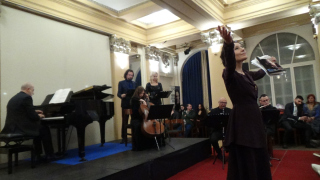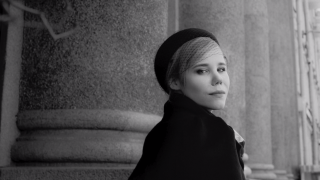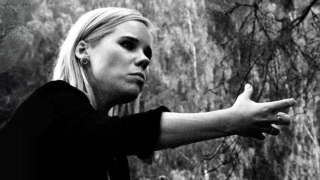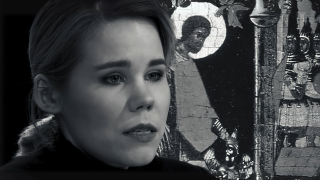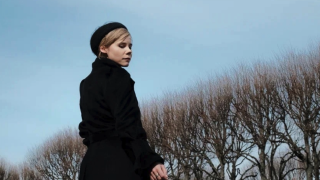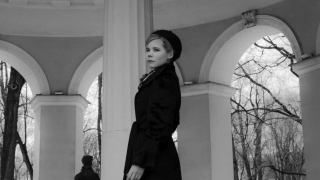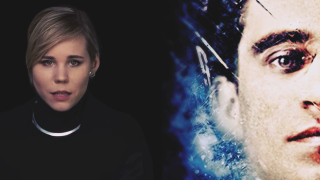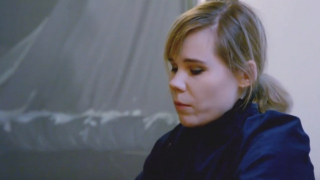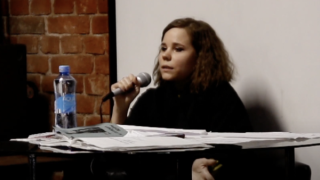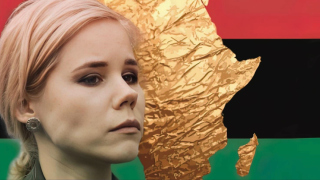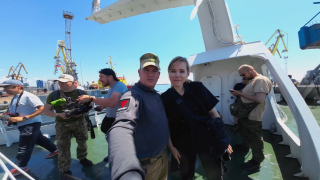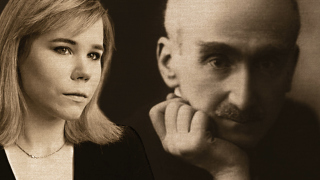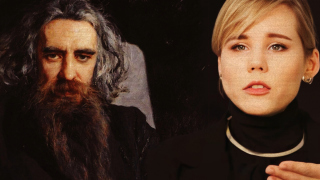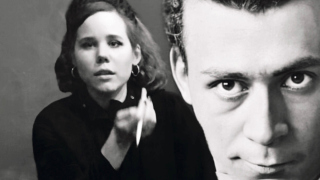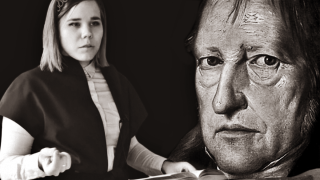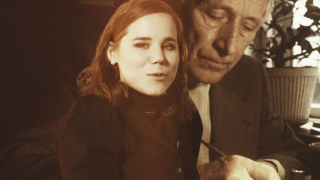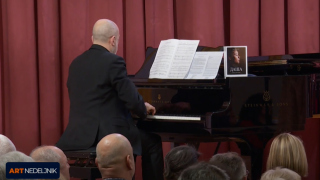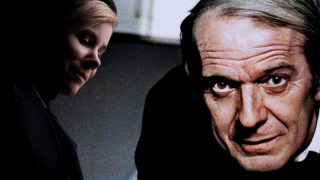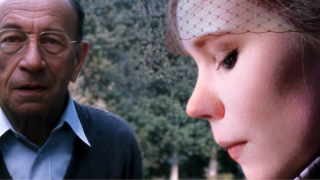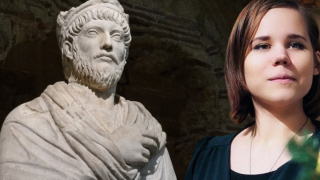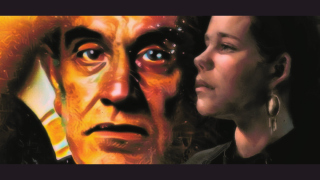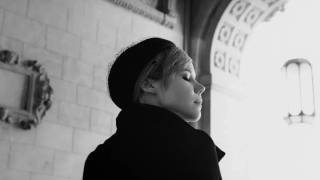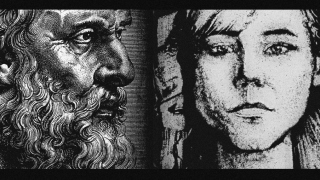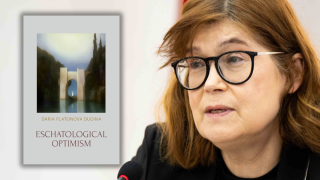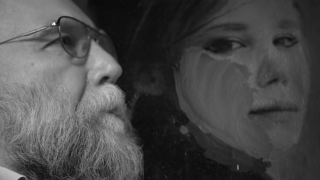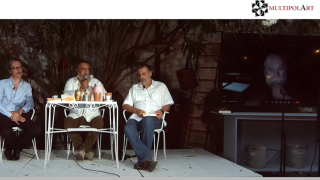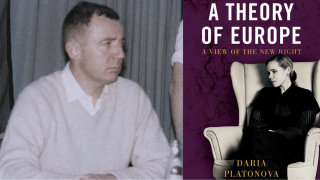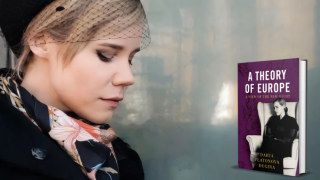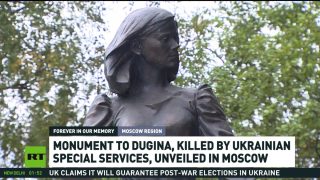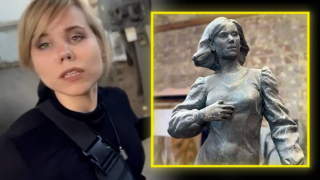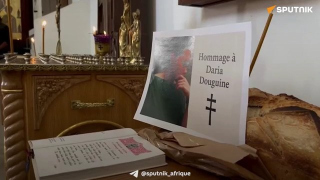- Главная
- Daria Dugina: The Traditionalism, The Philosophy and The Russian World
Daria Dugina: The Traditionalism, The Philosophy and The Russian World
Art by Alexey Belyaev-Gintovt, contemporary Russian artist.
https://vk.com/alexeygintovt , https://www.facebook.com/guintovt
Compilation of texts and thoughts by Daria Dugina narrated in English, about The Traditionalism, The Philosophy and The Russian World and quotes from her book and poems, so that her soul will be remembered for all eternity.
Listen to audio
Watch the video
-
La Cantata scenica di Darya Dugina a Belgrado
-
Eurosiberia Podcast #47: Daria Dugina’s Radical Life
Jafe Arnold from PRAV Publishing and Constantin von Hoffmeister discuss Daria Platonova Dugina’s life, death, philosophy, and legacy.
Order Eschatological Optimism here.
Order For a Radical Life here.
Order A Theory of Europe here.
-
World Premiere of the Scenic Cantata for Daria Dugina
World Premiere of the Scenic Cantata entitled Daria Dugina, created by Italian composer A. Inglese and performed by Italian musicians and singers E. Tsarenko, F. Armiliato, A. Rossano, G. Musillo, L. Di Ionna and M. Inglese.
-
The Poor Subject - Daria Dugina
Russian as an Enigma1
Russian thought lives where night parts with the day, in the cold dusk of the Russian forest. There is no “Russian philosophy” as such, and such a thing could never come to be. Philosophy means touching upon secrets, upon what is concealed, and vertically ascending to the heavenly world beyond.
Where are we to go if the beyond is within us? Russians have no border between “there” and “here.” We live in “herebeing.” And in here-being, we experience the sacred in every moment of our lives. Our thought is woven with dreaming and enmeshed in the structure of dreams.
Russians are spirit-seers. Our thought cannot grasp what it comprehends. It is what it comprehends. In our land, in the space of our soul, the comprehended and the comprehending merge. This is the mysterious, secret course of things, the frantic course of things. We have no subject — it is absolutely poor. We have no object — it is negligible and small. Perhaps, Russians today are in their thought and existence closest of all to authenticity. We do not comprehend this — we live it. It pierces the structure of the Russian soul, it cuts into our inner tissue, at times painfully.
Witnesses of the God-Forsaken
In the West, the subject stands at the center of everything, or rather, it once stood there before they destroyed it. First, the West was forsaken by God, and now it has been forsaken by the subject.
But us? We have something else. We are hurt by the Godforsakenness of Europe, we are the witnesses of Europe’s having been forsaken by God. We are God-bearers. We are the witnesses of subject-forsakenness, but… the Russian subject — what is it? A poor subject. So big that it starts to seem too small and poor. This poverty is not poverty in the sense of lack or need, but rather a poverty that surpasses riches and emeralds. It is like the poverty of a monk. The subject is so poor that it is almost absent– its will, its intention, is barely visible through the fog of the indistinguishable. Not only does it lack a trajectory, it lacks any point of initiation for a trajectory — no intending, no intended, no intention.
The Russian subject is the poor subject, a secret, mysterious force, the sphere of subtle being. This is real existence. It is hope that is not directed towards anything. It is Being itself. The Russian is too broad to be a subject. This meek, humble, directionless poverty is something confused, and hardly understands its own true wealth — that which, without being known, is already at the center of Being, at the center of Absolute Truth, at the center of the eternal light of the Good, in the punishment of the soul, where words are too exhausted to express the infinity and greatness of God.
References:
1. The present text was a speech delivered at the premiere of the late Andrei Iryshkov’s multimedia project and documentary film The Feminine Principle in Russian Philosophy at the Gorky Art Theater in Moscow on 27 January 2020.
Excerpt: from Eschatological Optimism by Daria Platonova Dugina
Translated by Jafe Arnold
https://pravpublishing.com/eschatological-optimism/
https://t.me/PRAVPublishing
-
Post-politics vs. existential politics - Daria Dugina
The 20th century was a century of rivalry between three ideologies. Some managed to reign for several centuries (liberalism), others for decades and years (communism and national socialism). But their demise seems obvious to us. All three ideologies, daughters of the New Age philosophy, have left the space of politics. The era of modernity has come to an end.
The end of the modern era
The death of liberalism does not seem as obvious as that of communism or national socialism. Francis Fukuyama proclaims 'the end of history', i.e. the end of the rivalry between the three ideologies and the final victory of the liberal doctrine. But liberalism did not win... This can be seen by paying attention to the subject of politics today. If in classical liberalism the subject of politics was the individual (its main virtue was freedom in the negative sense: accurately described by Helvetius, 'A free man is a man who is not chained, is not imprisoned, is not intimidated like a slave by the fear of punishment...'), today this individual no longer exists. The subject of classical liberalism is eliminated from all spheres, his wholeness is distrusted, his identity, even if negatively posed, is characterised as a failure in the functioning of the global virtual system of modernity. The world has entered the realm of post-politics and post-liberalism.
Rhizomatic politics
The individual has turned into a rhizome, the contour of the subject has dissolved with the belief in the New Age ("There has been no New Age!" proclaims Bruno Latour, noting in modernity the many contradictions and the failure to respect its own rules of operation - the constitution). "We are tired of wood", the logos of modernity is mocked by the liquid and fused society of postmodernity. A new actor in politics emerges: the post-subject. He thinks chaotically: slides change in his head at the speed of light, interfering with classical logical thinking strategies. The new thinking is that of a chaotic stub, glitch thinking. Politics is transformed into a wonderland in which the actor-evidence-Alice now increases, now decreases in the psychedelic scheme of the new post-rationality.
The contemporary left and right are an example of this pattern. The recent coalition of left and right against the National Front after the first round of the regional elections showed the end of the political model of modernity. The fusion of the values of the left and the right, united by a new kind of liberal virus. The modern left starts flirting with capital, actively defends the political values of the right (ecology) and the right takes on the comical character of fake nationalists.
A characteristic of post-politics is the blurring of the contours of the scale of the 'event'. The scale shifts dramatically ('Alice grows, Alice shrinks'). The modern confrontation between the system and terrorism has been called the Fourth World War by Baudrillard. In contrast to previous wars - the 1-2 world scale, WW3 - the confrontation of the two key geopolitical poles (US and USSR) - a softpower, semi-medieval war with the readiness to become a war with new weapons at any time; WW4 - a post-modernist war in which both enemy and friend are deftly intertwined (terrorism becomes part of the political system). WW4 flirts with scale: its main characteristic is randomness, chaos and arbitrariness in defining the scale of the event (the micro-narrative becomes the event, macro-narratives are ignored). A terrorist act occupies a small area: a building, a corridor, a few rooms or terraces (micro-narrative). But its significance is as great as the battle of Stalingrad (macro-narrative).
In classical wars, there were reference points against which we could relate the event and its meaning. In the modern political world, there are no reference points: it is like Alice in Wonderland. Now it decreases and then increases, but its 'normal, ideal' growth is impossible to identify (the chaos described by Deleuze in The Logic of Meaning). The logic of the political is abolished.
The terrorist attacks (130 dead - Paris, Friday 13) shake 'politics' more than large-scale wars (Syria). This shows that the world is entering a new phase: that of rhizomatic politics. To understand contemporary politics, we must learn to think in rhizomatic terms. Absorb the chaos.
Post-politics is a world of political technology, 5 seconds left-wing, socialist - 5 seconds right-wing, republican. Identity changes with the click of a TV remote control, technology. (Only the question arises: who controls the remote control, who decides to change the slide?) In Martin Heidegger's terms, the main force of modern post-politics: the machenschaft und tehnne.
An alternative to rhizomatic politics in a situation where ideologies are dead
Heidegger's writings offer a particular perspective on the organisation of the political. In liberal Western society, Heidegger's work and especially his political philosophy (which is not given explicitly) have not been sufficiently explored. As a rule, the study of Heidegger's political philosophy is reduced to an attempt to find in the philosopher an apologia for fascism and anti-Semitism (an example of this is the reaction of the philosophical community to the recent publication of the Black Notebooks, particularly eloquent from the French historian of philosophy Emmanuel Faye). Such an interpretation ignores the metaphysical dimension of Heidegger's philosophy and seems unnecessarily superficial and distorting of Heidegger's teaching.
Martin Heidegger cannot be interpreted in the context of any 20th century political theory. His critique of machenshaft applies not only to the Jews (and not on a biological, but on a metaphysical principle), but also, to a much greater extent, to National Socialism. In this sense, we can say that Heidegger represents a fundamental critique of National Socialism, in which he sees manifestations of machenshaft (as opposed to the 'spiritual', authentic National Socialism - which, according to Heidegger, was not realised under Hitler's rule).
Heidegger recognises a profound crisis in political systems. Applying the history of being to the history of the political, politics appears as a process of gradually forgetting being and approaching being. The modern political has no existential dimension, it exists in an inauthentic way. Politics and ontology are inseparable, Plato had already emphasised this in the Republic when he introduced the homology between the political and the ontological ('justice in the soul is the same as justice in the state').
Applying fundamentalistontology to the realm of the political, we can suggest that the political can exist authentically and inauthentically. The authentic existence of the politician is his commitment to being, the inauthentic one is his excessive preoccupation with being, his oblivion of being. The state in which the politician becomes authentically existential is hierarchical. The ontological stands above the ontic. The authentic over the inauthentic. The types of domination lie in a strict vertical line: from mahenschaft to herschaft.
In today's situation of crisis of the 'political', existential politics deserves special attention and seems to us a true alternative to rhizomatic politics. It needs in-depth study and further development.
Translation by Lorenzo Maria Pacini
-
The novel Laurus as a manifesto of Russian traditionalism - Daria Dugina
The novel-life, a 'non-historical novel' as the author Evgeny Vodolazkin (doctor of philology, specialist in ancient Russian literature) calls it, is a description of the destiny and inner development of Arseny the healer. After receiving medical training from his grandfather Christopher, Arseny enters life with all its complexities, temptations and trials. From the beginning, Arseny's profile betrays a man called in spirit and marked by a special gift, an unusual charisma. He is mobilised by a higher power to serve people. He is not of this world, but he serves people of this world. Already in this we can see the plot of suffering and pain.
During a plague, Ustina, a poor girl whose village has been hit by an epidemic, arrives at Arseny's house. The young healer welcomes her as he welcomes all those in need of help and succour, those who are in distress and have nowhere else to go and no one to turn to. Arseni lets her into his home, takes her in, gives her shelter and... they grow up together. Too much. And above all - without the sacrament of the church obligatory for a man from Old Russia. This means their union is sinful and brings with it pain, suffering, death and a dark end. Ustina becomes pregnant, but for fear of censure and reproach, Arseni does not take her to the wedding. Moreover, it is not clear how to explain that she was saved from the plague. So love turns out to be a sin, the child is the result of a fall, and on top of this complicated situation before the birth, which Arseniy himself is forced to take, Ustina does not receive communion, because how to explain her situation to the confessor?
And so the worst thing happens. Ustina dies during excruciating labour, the baby is stillborn. Arseny almost loses his mind with grief and the knowledge of his complicity in the horror that has occurred. Ustina and her stillborn child, who was not baptised, do not even deserve a proper funeral by the standards of the time; the woman in labour was not married and the child died unbaptised. Both are buried in the Bogedomk, a special place outside the Christian cemeteries where the corpses of vagabonds, ophi, sorcerers and clowns are thrown. Together with Ustina, the previous Arseni dies and a new one is born, Ustin, who takes as his name the male version of the name of his beloved, his victim and his sin. Thus the hero begins his path: the path of repentance, heroic deeds and suffering to overcome the enduring spiritual and metaphysical pain of his youth, detached from the axis.
Arseny-Ustin later becomes a famous herbalist and healer, his fame spreading throughout Russia. But this is only a stage. Then comes the time for a new 'transition'. And he moves along the chain of ancient Russian spiritual figures: madman, old man, prophet. The madman Thomas gives the hero a new name - from now on it is Amvrosy, and in turn he undertakes the feat of madness, achieving holiness and impassibility in voluntary humiliation and atypical - sometimes provocative - behaviour.
This is followed by a pilgrimage to Jerusalem with the Italian monk Ambrose and, on his return from the arduous journey, the assumption of the rank of monk and so on, all the way to the highest monastic order, the schema. Thus from Arseny Ustin was born Laurus - from the pain of the soul, seeing the body of his beloved Ustina thrown into the goddess; from witnessing the death of the monk Ambrose; from observing the elements during storms, in which sailors perished; from the general injustice of the world and the quagmire that covered Russian (and non-Russian) lands; from the infinite Russian spaces and souls, beyond the comprehension of both foreigners and Russians themselves.
"What kind of people you are," says the merchant Siegfried. - A man cares for you, he devotes his whole life to you, you torment him all his life. And when he dies, you tie a rope to his feet and drag him, and you are in tears.
- You have been in our land for a year and eight months already,' says the blacksmith Averky, 'and you have understood nothing of it.
- And you yourselves understand it? - Siegfried asks.
- Do we? - The blacksmith hesitates and looks at Siegfried. - Nor, of course, do we understand it ourselves.Milestones of human life Traditions
Arseny - Ustin - Amvrosii - LaurusLaurus' life, which in his hagiography is divided into several cycles - childhood/youth/maturity/old age and 'sannyasa' (the life of a hermit who completely renounces the world) - the life of a man of the Tradition.
In the description of Laurus' ascetic life, the Indo-European canon of the life of a man of Tradition (vividly described in the Manu-smriti and other Hindu scriptures) striving for liberation, consisting of four cycles, is manifested. The novel, like the life of Laurus, is divided into four parts: 'The Book of Knowledge', 'The Book of Renunciation', 'The Book of the Way' and 'The Book of Rest'. According to the Upanishads, liberation becomes possible if one lives the three ashrams (three stages of life) with dignity:
1) Study of the Vedas, discipleship (brahmacharya) - the first stage of Arseni's life - learning from the wisdom of his grandfather Christopher
2) Home and sacrifice for wife and family (grihastha) - Arseniyya's family, Ustina's death and further acceptance of her in herself - constant dialogue with the deceased lover
3) The years of hermitage in the forest (vanaprastha) - both herculeanism and wandering and the journey to Jerusalem
4) The last ashram period (sannyasa) - associated in Hinduism with withdrawal from worldly affairs and full devotion to spiritual development, it is a period of meditation and preparation for death. In Hindu tradition, it was very important to die homeless, naked, alone, an unknown beggar. This is how Laurus dies, after being slandered.It is important to note that at each of these stages of life in the Tradition there was a change of name. Thus, we readers witness a sequence of 4 characters - Arseny, Ustin, Ambrosius and Laurus - each manifesting 4 different stages of human formation in Indo-European tradition.
"I have been Arseny, Ustin, Ambrosius, and now I am Laurus. My life is lived by four different people who have different bodies and different names. Life is like a mosaic and it falls apart,' says Laurus.
Being a mosaic does not mean falling apart, Innocent replied. You have broken the unity of your life, you have given up your name and identity. But even in the mosaic of your life there is something that unites all its separate parts, it is the aspiration to Him (God - author's note). In Him they will be reassembled,' replies Elder Innocent.
Four different lives, stages, images, faces-personalities merge into one face. The passage of the four stages of life in the novel is the successive ascent of man from the lowest to the highest, from material manifestation to the highest realisation - the theurgic sacrament. What is described in Laurel is the Neo-Platonic experience of the soul's return to its source, the Good, the One. The novel can be considered in the Neoplatonic scheme of the ascent of creation to its ineffable source.
These four periods in the protagonist's life also have a social, caste dimension: the ascent from one stage to the next is also a change of social status. From disciple to 'husband', from 'husband' to hermit, from hermit to monk and hermit. All this is a movement along the vertical axis of social strata: while in the first part Arseny has a house, books, herbs and a small territory, at the end of the book he has no walls and his refuge is the stone vaults, the trees and the forest. Thus, moving on to a new phase, Arseny also separated himself from Christopher's books. The new hero, the philosopher and guardian, is not fit to have any private property. He cannot have anything, because the possession of something means weakening the tension of contemplation of the high. At the end of the novel, Laurus has nothing, all his food is that of birds and beasts, he no longer even belongs to himself. He belongs to the Absolute.
The problem of time and eternity in the novel Laurus
One of the novel's main themes is the problem of the interpretation of time: material time in Laurus, following Platonic topics, is understood as "the moving simulacrum of eternity". Two dimensions seem to coexist in the novel: a linear time leading to the end (the eschatological line of the novel comes from the West - Ambrose comes to Russia to find the answer to the question of the date of the end of the world), a Judeo-Christian dimension and an eternal-mythological dimension, originating in the ancient tradition, which in Christianity has become a dimension of the circular cycle of worship, which simultaneously appears as a spiral and turns into a paradox: Reproducible events - the festivals of the Church - which occur 'again' each time, come true as if they had never happened before. Each time, events similar in meaning appear different (a conversation between Laurus and Elder Innocent: 'Because I love geometry, I liken the movement of time to a spiral. It is a repetition, but at a new and higher level'). Even the narrative itself, the life of Arseni Arseny us reproduces the spiral - many events in the novel are similar, but each time they occur at a new 'higher level' (e.g. at the end of his life - Arseny, formerly Laurus, gives birth again, this time the mother in labour does not die, and the baby survives).
'There are similar events,' the elder continued, 'but from this similarity comes the opposite. The Old Testament is inaugurated by Adam, but the New Testament is inaugurated by Christ. The sweetness of the apple eaten by Adam is revealed to be the bitterness of the vinegar drunk by Christ. The tree of knowledge leads man to death, but the tree of the cross gives man immortality. Remember, Amvrosius, that repetition is given to us to overcome time and our salvation.
The coexistence of the two dimensions - temporal and eternal - is also evident in the very structure of the narrative: in Lavra, the descriptions of medieval Russian life are intricately interwoven with contemporary episodes, the protagonist lives with the dead - he constantly talks to them, discusses them, talks about his experiences. This structure is largely related to postmodern novels. Vodolazkin is certainly a postmodernist in his technique. However, by filling the 'collage' with plots from different milestones, he places the deep traditionalist meanings above the technique. In the novel, the coexistence of several epochs is shown in a particularly subtle and vivid way: we find ourselves in medieval Russia, then we move into the modern world with researchers, book lovers and historians, then we find ourselves witnessing Soviet terminology - Vodolazkin has succeeded in a very clever and organic way in showing synchronism, the parallel existence of several epochs and dimensions. Just as different slices of time coexist in the novel, so in us today there is both the archaic and the future. We today are our ancestors, watching the rapidly changing world through our eyes, and our future children.
The novel 'Laurus' is a large-scale manifesto of Russian traditionalism, an embodiment of the Russian paradox of the coexistence of time and eternity in us, of this Indo-European canon of hagiography dressed up as medieval znakhar, of this myth of eternal return and cutting through this myth with the arrow of time, heading towards the end of the world. 'Laurel' is a manifesto of the vertical movement. The one we have forgotten behind the frenzy of everyday life. And it manifests itself so clearly in times of pestilence. Then and now.
"Isn't Christ the general direction?" the elder asked. What direction are you still looking for? And do not be carried away by the horizontal movement beyond measure. And of what?" asked Arsenius. Vertical movement, replied the elder and pointed upwards.
Translation by Lorenzo Maria Pacini
-
The apophatic tradition: the theology of Dionysius the Areopagite - Daria Dugina
The work of the famous Christian theologian and mystic, whose writings have entered the Christian tradition under the name of Dionysius the Areopagite, is a unique phenomenon in the history of philosophical and religious thought. He has had an enormous influence on all Christian philosophy, eastern and western, and consequently on New Age philosophical thought in one way or another since the Middle Ages, where the Areopagitans played such an important role.
Almost all scholars of the Areopagitic Corpus agree that it is Platonism in Christian form. Consequently, we must place it in the general context of Platonic philosophy in order to understand its place and dissect its characteristics.
The Areopagitics are reliably known from the 5th century AD. Thus they are separated from Plato himself and his Academy by about 10 centuries. During this time Platonism underwent a series of fundamental metamorphoses, institutionalisations and interpretative shifts, which must be traced in the most general way to understand the historical-philosophical process from Plato (5th - 6th century BC) to the Areopagitics (5th century BC).
This period can be divided into three phases:
1 - Post-Platonist Academy (Speusippus, Xenocrates, etc.), of which few reliable testimonies are known and whose philosophical specificity is problematic today due to the extremely scarce testimonies;
2 - Middle Platonism (Posidonius, Plutarch of Cheronia, Apuleius, Philo);
3 - Neoplatonism, which arose in Alexandria and from the beginning was divided into two schools: pagan (Plotinus, Porphyry, etc.) and Christian (Clement of Alexandria, Origen, etc.).The Areopagitics are closely related to Neoplatonism and their particularity lies in the fact that we find in them the influence of both Neoplatonic tendencies simultaneously - Origenistic (which also indirectly predetermined the dogmatic basis of Christianity) and pagan (embodied in the 5th century in the monumental philosophical and theological system of Proclus Diadochus, who made an unprecedented effort to systematise Platonism as a whole).
On a more general level, we can consider the first phase as a continuation of Plato's paideia in the direction indicated by Plato himself: refinement of philosophical discourse and hermeneutical practices in the general key of Plato's approach, without distinguishing priority directions and convincing attempts to systematise Plato's doctrine itself.
In the second phase, systematisation begins, leading to the identification of the nodal points of his teaching, including the identification of contradictions, problematic segments and conflicting interpretations. Here it is extremely important for us that Plato's teaching is for the first time subjected to correlation with theological knowledge, i.e. it is theologised. This can be seen, first of all, in the work of Philo of Alexandria, who tried to relate Plato's philosophy and cosmology of the Timaeus and the Republic to the religion of the Old Testament and its dogmatic postulates - in particular, about God the Creator, monotheism, etc. - and to the theological theology of the Old Testament. Here, for the first time, the problem arises of how Platonic ideas and Platonic demigods relate to each other and how they can be related to the personal God of Jewish monotheism. Thereafter, Philo had an enormous influence on the formation of Christian dogmatics and, consequently, the relationship between Platonism and theology in his philosophy was of fundamental importance for all that followed.
After Philo, the Christian Gnostics (primarily Basilides) became an important link in the development of Platonism. Many of them were decisively influenced by Plato, as Plotinus says in detail in Ennead II.9. But the Gnostics were already reading Plato through the prism of Middle Platonism and in particular the writings of Philo, and also in the context of early Christianity with its acute reflection on how the New Testament and the age of grace relate to the Old Testament and the age of law. With the Gnostics, this relationship took on an antagonistic expression that resulted in dualism. It is important for us that this dualism was framed through Platonic philosophy. Christian Gnosticism can therefore be said to represent a particular version of Platonism, a dualistic version.
The schools of Plotinus and Origen, i.e. Neo-Platonism proper, as the third stage in the formation of this movement, leading directly to the author of the Areopagitics, were the result of the development of Middle Platonism and to a large extent a response to the dualistic Platonism of the Gnostics. Not only Clement of Alexandria and Origen, but also Plotinus polemised with the Gnostics, and their rejection of Gnosticism prompted them to develop a dialectical and systematised Platonism that accepts the challenge of the theologising and dualism, characteristic of the Middle Platonists and the Gnostics, but gives a decidedly non-dualistic response to them. To borrow a term from Hindu philosophy, it would be fashionable to call Neo-Platonism 'advaito-platonism', i.e. non-dual Platonism.
The mystical theology of the Areopagitics falls entirely within the context of this non-dual Platonism and is a striking example of it, albeit less systematic and developed than those of Origen or Proclus. At the same time, the 5th century represents a time of waning of the dogmatic impulse that had animated the previous centuries of Greco-Roman patristics, anticipating the era of the Christian Middle Ages that followed. The style and conceptual apparatus of the Areopagitica were in the best way appropriate to this transitional period: it completed the era of Neo-Platonism, on the one hand, and Greco-Roman patristics, on the other, but it also shaped one of the most important vectors of the future development of Christian thought - including that of trans-European scholasticism, on whose formation John Scotus Eugenius to Thomas Aquinas had had such an important influence.
Translation by Lorenzo Maria Pacini
-
Is there a political philosophy in the Neo-Platonic tradition? - Daria Dugina
"Because the state is man in large format and man is the state in small format"
— Friedrich Nietzsche
Friedrich Nietzsche, in his lectures on Greek philosophy, called Plato a radical revolutionary. Plato, in Nietzsche's interpretation, is the one who surpasses the classical Greek notion of the ideal citizen: Plato's philosopher becomes above religiosity, directly contemplating the idea of the Good, unlike the other two properties (war and artisans).
This rather closely echoes the neo-Platonist Proclus' model of Platonic theology, where the gods occupy the lowest position in the hierarchy of the world. Recall that in Festugier's systematisation, Proclus' world hierarchy is as follows:
- The supra-substantial (in which there are two beginnings: the limit and the infinite),
- the mental (being, life, mind),
- intermediate (mind-thought: beyond, celestial, below),
- thought (Chronos, Rhea, Zeus),
- Deity (divine, detached, intra-cosmic heads).Plotinus places forms above the gods. The gods are only contemplators of absolutely ideal forms.
"Brought to His shore by the wave of the mind, rising to the spiritual world on the crest of the wave, one immediately begins to see, without understanding how; but sight, approaching the light, does not allow one to discern in the light an object that is not light. No, then only the light itself is visible. The object that is accessible to sight and the light that enables it to be seen do not exist separately, just as the mind and the thought-object do not exist separately. But there is pure light itself, from which these opposites then arise'.
The God-Demiurge in the Timaeus creates the world according to the patterns of the world of ideas, occupies an intermediate position between the sensible world and the intelligible world - so does the philosopher, establishing justice in the state. This is a rather revolutionary concept for ancient Greek society. It places another essence above the gods, a supra-religious and philosophical thought.
Plato's dialogue Republic constructs a non-classical psychological and political philosophy. Types of soul are compared with types of state structure, from which different conceptions of happiness are derived. The goal of each person, ruler and subordinate, is to build a fair state consistent with the ontological hierarchy of the world. It is this concept of the interpretation of politics and the soul as a manifestation of the ontological axis that Proclus Diadochos develops in his commentary on Plato's dialogues.
While it is easy to talk about Plato's political philosophy, it is much more difficult to talk about the political philosophy of the Neo-Platonic tradition. Neo-Platonism was usually perceived as a metaphysics that aimed at the deification of man ('assimilating him to a deity'), seen separately from the political sphere. However, this view of Neo-Platonic philosophy is incomplete. Proclus' process of 'assimilation to divinity', which derives from Plato's metaphysical function of the philosopher, also implies the Political is included. Deification also occurs through the political sphere. In Book VII of the dialogue Republic, in the myth of the cave, Plato describes a philosopher who escapes from the world of spears and ascends into the world of ideas, only to return again to the cave. Thus, the process of 'resembling a divinity' has a two-way direction: the philosopher turns his gaze to ideas, overcomes the world of illusion and rises to the level of the contemplation of ideas and, thus, the idea of the Good. However, this process does not end with the contemplation of the idea of the Good as the final stage - the philosopher returns to the cave.
What is this descent of the philosopher, who has reached the level of the contemplation of ideas, into the untrue world of shadows, of copies, of becoming? Is it not a sacrifice of the philosopher-director for the people, for his people? Does this descent have an ontological apologia?
Georgia Murutsu, a scholar of Plato's State, suggests that the descent has a double meaning (an appeal to Schleiermacher's reading of Platonism):
1) the exoteric interpretation explains the descent into the cave by the fact that it is the law that obliges the philosopher, who has touched the Good through the power of contemplation, to render justice in the state, to enlighten the citizens (the philosopher sacrifices himself for the people);
2) The exoteric sense of the philosopher's descent into the nether world (into the area of becoming) corresponds to that of the demiurge, reflecting the emanation of the world's mind.The latter interpretation is widespread in the Neo-Platonic tradition. The role of the philosopher is to translate what he contemplates eidetically into social life, state structures, the rules of social life, the norms of education (paideia). In the Timaeus, the creation of the world is explained by the fact that the Good (transubstantiating 'its goodness') shares its content with the world. Similarly, the philosopher who contemplates the idea of the Good, as this Good itself, pours goodness upon the world, and in this act of emanation creates order and justice in the soul and in the state.
"The ascent and contemplation of higher things is the ascent of the soul into the realm of the intelligible. If you admit this, you will understand my dear thought - if you soon aspire to know it - and God knows it is true. Here is what I see: in what is perceivable the idea of good is the limit and is barely perceptible, but as soon as it is perceptible there, it follows that it is the cause of all that is just and beautiful. In the realm of the visible it gives rise to light and its ruler, but in the realm of the conceivable it is itself the ruler on which truth and reason depend, and it is to it that those who wish to act consciously in both private and public life must look".
It is worth noting that the return, the descent into the cave, is not a unique process, but a constantly repeating process (realm). It is the infinite emanation of the Good in the other, of the one in the many. And this manifestation of the Good is defined through the creation of laws, the education of citizens. Therefore, in the myth of the cave, it is very important to emphasise the moment when the ruler descends to the bottom of the cave - the 'cathode'. The vision of the shadows after the contemplation of the idea of the Good will be different from their perception by the prisoners, who have remained all their lives in the lower horizon of the cave (at the level of ignorance).
The idea that it is the deification and the particular kenotic mission of the philosopher in Plato's State, in its Neo-Platonic interpretation, that constitutes the paradigm of the political philosophy of Proclus and other later Neo-Platonists, was first expressed by Dominic O'Meara. He acknowledges the existence of a 'conventional viewpoint' in the critical literature on Platonism that 'Neo-Platonists have no political philosophy', but expresses the conviction that this position is wrong. Instead of contrasting the ideal of theosis, theurgy and political philosophy, as scholars often do, he suggests that 'theosis' must be interpreted politically.
The key to Proclus' implicit philosophy of politics is thus the 'descent of the philosopher', κάθοδος, his descent, which repeats, on the one hand, the demiurgic gesture and, on the other, is the process of emanation of the Element, πρόοδος. The philosopher descending from the heights of contemplation is the source of legal, religious, historical and political reforms. And what gives him legitimacy in the field of the Political is precisely the 'resemblance to divinity', the contemplation, the 'rising' and 'returning' (ὲπιστροφή) that he performs in the previous phase. The philosopher, whose soul has become divine, receives the source of the political ideal from his own source and is obliged to carry this knowledge and its light to the rest of humanity.
The philosopher-king in the Neo-Platonists is not gender-specific. A female philosopher can also be in that position. O'Meara considers the late Hellenistic figures of Hypatia, Asclepigenia, Sosipatra, Marcellus or Edesia as prototypes of such philosopher rulers praised by the Neo-Platonists. Sosipatra, the bearer of theurgical charisma, as head of the School of Pergamum, appears as such a queen. Her teaching is a prototype of her disciples' ascent up the ladder of virtues towards the One. Hypatia of Alexandria, queen of astronomy, presents a similar image in her Alexandrian school. Hypatia is also known for giving the city's politicians advice on how best to govern. This condescension in the cave of people from the height of contemplation is what cost her her tragic death. But Plato himself - following the example of Socrates' execution - clearly foresaw the possibility of such an outcome for a philosopher who had descended into the Political. Interestingly, the Christian Platonists saw in this a prototype of the tragic execution of Christ himself.
Plato prepared a similar descent for himself, proposing to create an ideal state for the ruler of Syracuse, Dionysius, and being treacherously sold into slavery by the adulterous tyrant. The Neo-Platonic image of the philosopher-queen, based on the equality of women assumed in Plato's Republic, is a particularity in the general idea of the connection between theurgy and the realm of the Political. It is important for us that Plato's image of the philosopher's ascent/descent from the cave and his return to the cave has a closely parallel interpretation in the realm of the Political and the Theurgical. This is at the heart of Plato's political philosophy and could not be missed and developed by the Neo-Platonists. Another issue is that Proclus, being in the conditions of Christian society, was not able to fully and openly develop this theme, or else his purely political treatises have not come down to us. The example of Hypatia shows that Proclus' caution was not superfluous. However, being aware that ascension/descension was initially interpreted both metaphysically, epistemologically, and politically, we can consider everything Proclus said about theurgy from a political perspective. The deification of the soul of the contemplative and the theurgist makes him a true politician. Society may or may not accept him. Here the fate of Socrates, Plato's problems with the tyrant Dionysius, and the tragic death of Christ, on whose cross was written 'INRI - Jesus the Nazarene King of the Jews. He is the King who came down to men from heaven and ascended to heaven. In the context of Proclus' pagan neo-Platonism, this idea of truly legitimate political power should have been present and built on exactly the same principle: only he who has 'descended' has the right to rule. But to descend, one must first ascend. Therefore, theurgy and 'resembling a deity', while not being political procedures in themselves, implicitly contain the Politic and, moreover, the Politic only becomes platonically legitimate through them.
The 'resemblance to a divinity' and the theurgy of the Neo-Platonists contain in themselves a political dimension, which is embodied at its most in the moment of the philosopher's 'descent' into the cave.
Translation by Lorenzo Maria Pacini
-
The “Right-Wing Gramscianism” Phenomenon: The Experience of the “New Right” - Daria Dugina
The “New Right” is an ensemble of intellectual movements that appeared in 1968 as a reaction to ideological crisis and the strengthening of liberal hegemony in Europe. By 1968, the classical “rightwing” movements were riddled with liberal ideological motives, such as the adoption of capitalism, pro-American sentiments, and statism. In turn, the “left-wing” agenda, the core of which was constituted by opposition to capitalism [1], was also affected by liberal influences. Egalitarianism, individualism, the negation of differences between cultures, and universalism were rendering “left-wing” movements allies and partners of the liberal doctrine.
The “New Right” ensemble of intellectuals engaged in studying European identity, a research which differed from contemporary analogues first and foremost because it did not consider itself to be a “left-wing” or “right-wing” movement. The movement’s main ideologists spoke about the necessity of overcoming the artificial political schism and transitioning to a new doctrine, one which would be a mix of the best ideas from the “left-wing” and “right-wing” intellectual movements. As Guillaume Faye remarked at a conference of the Research and Study Group for European Civilization (G.R.E.C.E.): “Our society is no longer inspired by the renewal of its ideology. This ideology today is at its “culmination” – and therefore at the beginning of sunset, dead ideas have become moral canons, systems of habits, ideological taboos, which do not enthuse anymore” [2].
The very title “New Right” dates back to 1979, when it was impossible not to notice the influence of the “Research and Study Group for European Civilization” (G.R.E.C.E.) on the political culture and intellectual life of France. Such a “label” appeared in the summer of 1979 first in French and later European and even American media – more than 500 publications were published in just one summer, whose main goal was quite obvious: to diminish the influence of de Benoist and his supporters’ ideas. Such a media campaign only strengthened the positions of the movement – it thereby began to appear in other European countries. The New Right has accomplished the colossal work of compiling a unified set (encyclopedia) of the best European thinkers (from Plato to Nietzsche, Lorenz to Jünger). They opened up France to the ideas of the Conservative Revolutionists, the NationalBolsheviks, the philosophers of the “New Beginning”, and other phenomenologists, sociologists, social anthropologists, and ethnologists who greatly contributed to the development of European culture. Among their inspirations were Ersnt Niekisch, Ernst Jünger, Arthur Moeller van den Bruck, Oswald Spengler, Friedrich Nietzsche, Martin Heidegger, Claude Lévi-Strauss, Arnold Gehlen, Jean Thiriart, Louis Dumont, and Pierre-Joseph Proudhon.
A complex rethinking of European civilization and creating a front of “counter-hegemony” that would confront the universalism, globalism, egalitarianism carried out under the liberal agenda through an alternative and somewhat symmetric ideology, and also via reconstruction of European culture in all of its diversity, came to be the main tasks of the New Right. The movement initially took shape around the “Research and Study Group for European Civilization” (G.R.E.C.E.) and “New School” (“Nouvelle École”).
In 1973, the New Right launched the iconic magazine “Elements” (“Éléments”), which became a new platform for the meeting of intellectuals who set before themselves the task of reviving European Culture along the principles of holism, anti-liberalism, tradition, and anticapitalism. In 1988, the New Right launched the print publication “Crisis” (“Krisis”), a magazine for “ideas and debates”. Unlike many other political publications coming out of France at the time, the New Right’s print editions proclaimed themselves to be platforms where the opposition between “left and right” was overcome. As de Benoist wrote in the book “Les Idées à l’endroit”, the New Right practically “flipped the table of ideas” existing the time, leaving the field of the classic confrontation of “left” and “right”.
One important aspect of the New Right’s activity came to be the development of a theory of “right-wing Gramscianism.” Building on the works of Antonio Gramsci, Alain de Benoist criticizes the ideological and cultural hegemony of liberalism and declares the necessity of creating an alternative that would be founded on the values of European civilization – holism, tradition, a pluriversal perception of the world, Europe’s continental identity, and replacing abstract “human rights” with “peoples’ rights”. De Benoist has remarked: “In a sense, and if we stick to only methodological aspects of the culture’s power (pouvoir culturel) theory, some views of Gramsci are virtually prophetic” [3].
One of G.R.E.C.E.’s conferences (the XVI colloque national), which took place on 29 November 1981 in the Palais des Congrès in Versailles, was devoted to the topic of “right-wing Gramscianism”. At the opening of the G.R.E.C.E. conference on “right-wing Gramscianism”, Professor M. Vayof of Nancy-Université emphasized: “To be Gramscianists for us is to admit the importance of cultural power (pouvoir culturel) theory: we are not talking about preparing the rule of some political party, rather, we want to transform the mentality to support a new system of values, where the political translation [political area] does not interest us at all” [4]. Alain de Benoist, the historian of ideas and chief ideologist of G.R.E.C.E., also remarked that political processes change all the while as the “ideological majority” remains the same”: “Now we can talk about a consent, rather than a contradiction between the political, ideological and sociological majority. Such consent represents the main state of affairs” [5]. From de Benoist’s point of view, “left-wing” ideology, riddled with liberal tendencies (individualism, priority of the economic sector over all others), has created a climate in which no political development can take place. For de Benoist, it is important to highlight the fact that behind the façade of “left-wing” ideas in recent decades hides the very same liberalism (liberal ideology and culture) and “consumer society”. The goal of right-wing Gramscianism is to get out of the system of liberal hegemony through the development of alternative culture and metapolitical codes. De Benoist describes such a way out of the “universalist” culture in existential categories: “We are at midnight, we are at the prime meridian of active nihilism. <…> Participation in our enterprise does not mean choosing one clan against another. It means getting out of the trolleybus, which does nothing but drives across the opposite poles of the same ideology – with or without stops” [6]. De Benoist notes that we are talking about “changing the universe”, “giving the world its color, memory – its measures, peoples – their historical opportunity and fate of being” [7]. For the New Right, ideas become weapons. As Guillaume Faye remarked:
“Isolated intellectuals, neutral, not at war, have never marked history with their stamp. <…> G.R.E.C.E. and our entire movement does not at all intend to give ideology to liberals or conservatives, as well as to the “leftwingers”, but wants to bring into society, in all its complexity, the strength of different ideas. To execute “right-wing Gramscianism” means to spread a system of values that:
— will work for a long time;
— will contain competing formulas;
— will be brought in through a metapolitical strategy;
— will be located outside political institutions.
G.R.E.C.E. also spreads a view of the world (which can be expressed through action in the cultural sphere, or in a purely intellectual sphere) through the construction of a theoretical corpus, which is never complete, but always developing. Such a corpus presupposes the inclusion of many disciplines in it – from biology to philosophy” [8].
Also in his speech at the G.R.E.C.E. conference on right-wing Gramscianism, he emphasized that “the ideological corpus [G.R.E.C.E.] is radically open, is in constant evolution, unites new disciplines, accepts new ideas, is in constant interaction with reality”.
“Right-wing Gramscianism” thus reveals the dominance of liberalism in the field of culture and advocates the construction of counter-hegemony. For the New Right, the positions of “right-wingers” in relation to liberal hegemony in culture are not suitable, as the “rightwing” refrains from engaging in the war for ideas. De Benoist considers the latter to be a fatal mistake (Caesarism), insofar as losing and leaving culture to liberalism leads to any politics inevitably turning into a liberal politics. But de Benoist also views the “left-wing” opposition to liberal culture as ineffective. Capitalism in both the “rightwing” and “left-wing” intellectual space becomes a kind of code which can only be resisted by an alternative code.
In positioning and describing such a “right-wing Gramscianism”, “independence from ideologies” is also important. Representatives of the “New Right” have formulated the idea that the ideologies of the Modernity which have been in strict opposition and state of struggle are a phenomenon exclusive to Western culture. The position of the right-wing Gramscianism is based on the idea of building a “territory free of ideologies.” This territory would reject “individualism”, egalitarianism and the concept of abstract human rights (which are interpreted by the “New Right” to be a forgery of liberal doctrine).
Right-wing Gramscianism is thus conceived as a territory of metapolitics beyond the influence of hegemony, that is, the authority of liberal culture with its algorithms, practices and institutions. Gramsci himself viewed communism as an alternative to hegemony or counter-hegemony, primarily in its active Leninist version, where politics is ahead of economics and culture is ahead of politics. G.R.E.C.E. however, attributes contemporary communism to hegemony, i.e., they interpret it to be an extremely “left-wing” version of liberalism itself.
And then the thesis of right-wing Gramscianism acquires all its meaning: it is an invitation to create a new version of counter-hegemony that would challenge the entire political theology of modern times. From Gramsci, however, the “New Right” took, first of all, the thesis that the source of power should be sought precisely in culture, in the historical pact that the intellectual freely concludes with this or that historical dominant.
De Benoist chooses the side of Labor against Capital (in this he is a consistent Gramscianist), but he interprets the principle of Labor (Arbeit) rather in the spirit of Ernst Jünger and his Worker (der Arbeiter). Again, here we are not talking about nationalism as another version of the same capitalist culture (and, therefore, about another version of the same hegemony), but about going beyond the borders of Modernity as a whole, into yet unknown territory – beyond “right” and “left”.
Therefore, “right-wing Gramscianism” is only a conventional name. It is not so much “right-wing” as “non-left-wing”, i.e., it does not recognize communism to be an adequate counter-hegemony. But it is also not “right-wing” in the conventional sense, since it rejects capitalism and nationalism. Later, the French sociologist Alain Soral, who continued this line, would call this counter-hegemonic synthesis “Left-wing Labor + Right-wing Values.”
This is most fully reflected in the Fourth Political Theory, to which A. de Benoist came already in the 2000s. Here, as in Gramsci, an antithesis to hegemony (including its interpretation by Gramsci himself as international – imperialist – capitalism) is posed and the primacy of culture is recognized. But Marxism – at least in its dogmatic version – is discarded and a free search begins for philosophical, sociological and anthropological studies that do not fall under the classical criteria and which can come to form the basis of a new metapolitical topology.
In 40 years, the New Right has come a long way in developing their metapolitical theory and related strategies. To date, the conceptual apparatus and theoretical algorithms developed by them are the most adequate for the interpretation of such phenomena as European populism, the crisis of globalism, and the emergence of multipolarity. This is increasingly recognized not only by the “right”, but also by the “left”, such as the Italian communist Massimo Cacciari, the French sociologists Serge Latouche and K.-M. Mishea, and the left-wing intellectual Chantal Mouffe.
References:
[1] Pour un gramscisme de droite. Acte du XVIe colloque national du GRECE. Paris: Le Labyrinthe, 1982. P. 72.
[2] A. de Benoist, Les Idées à l’endroit. Paris: Editions Libres Hallier, 1979. P. 258. [
3] Pour un gramscisme de droite. Acte du XVIe colloque national du GRECE. Paris: Le Labyrinthe, 1982. P. 7.
[4] Ibid. P. 11.
[5] Ibid. P. 21.
[6] Ibid.
[7] Ibid.
[8] Ibid.
Translated by Jafe Arnold
From The Theory of Hegemony and Counter-hegemony
Almanac by “Sun of the North”
-
The Universe of Platonic Thought - Daria Dugina
We publish the talk by Daria Dugina, former researcher of Political Philosophy at Moscow State University, given during the 16th International Conference “The Universe of Platonic Thought” in St. Petersburg on August 28-30, 2018.
Political philosophy has always been denied full recognition, focusing on analyzing the metaphysical aspects of Neoplatonism. Neoplatonic concepts such as “permanence” (μονή), “emanation” (πρόοδος), “return” (ὲπιστροφή), etc. were treated in historical-philosophical works separately from the sphere of the Political [1]. Thus, the Political was interpreted only as a stage of ascent toward the Good, embedded in the rigid hierarchical model of Neoplatonic philosophical thought, but not as an independent pole of the philosophical model.
This view of the Neoplatonic philosophical heritage seems insufficient to us. We would like to take the example of Proclus' works to show that in Neoplatonism the Political is interpreted as an important and independent phenomenon embedded in a general philosophical, metaphysical, ontological, epistemological, and cosmological context.
While in classical Platonism and in Plato himself political philosophy is explicitly expressed (dialogues “State”, “Politics”, “Laws”, etc.), in Neoplatonism and especially in Proclus we can judge the philosophy only indirectly and mainly in commentaries on Plato's dialogues. This is also due to the political-religious context of the society in which the later Neoplatonists, including Proclus himself, operated.
At present, the political ideas of the Neo-Platonists have not been sufficiently studied, and, moreover, the very fact of the existence of Neo-Platonic political philosophy (at least in the late Greek Neo-Platonists) has not been proven and is not the subject of scientific and historical-philosophical research. However, Neoplatonic systems of political philosophy were widely developed in the Islamic context (from al-Farabi to Shiite political gnosis [2]), and Christian Neoplatonism in the versions of Western authors (in particular, Blessed Augustine [3]) largely influenced the political culture of medieval Europe.
At present, the topic is underdeveloped. In Russian there are practically no research works devoted specifically to Proclus' political philosophy. Among foreign sources, the only specialized studies are “Platonopolis” by Dominic O'Meara, the English specialist in Neoplatonic philosophy [4], “Founding Platonopolis: Platonic Polytheism in Eusebius, Porphyry and Jamvlich [5], separate chapters in “Proclus. Neoplatonic Philosophy and Science” [6] and comments by A.-J. Festujer to French translations of Proclus' major works, especially the five-volume “Commentaries on Timaeus” [7] and the three-volume “Commentaries on the State” [8].
Proclus Diado (412-485 CE) was one of the most important thinkers of late antiquity, a philosopher whose works express all the main Platonic ideas developed over many centuries. His writings combine religious Platonism with metaphysical Platonism; to some extent he is a synthesis of all previous Platonism-both classical (Plato, Academia), “middle” (described in J. Dillon [9]), and Neoplatonism (Plotinus, Porphyry, Jambleach). Proclus was probably the third scholar of the Athenian school of Neoplatonism (after Plutarch of Athens and Syrianus, Proclus' teacher), which existed until 529 (until its closure by Justinian, who issued edicts against pagans, Jews, Arians and numerous sects, and denounced the teaching of the Christian Platonist Origen).
Proclus' philosophical hermeneutics is an absolutely unique event in the history of the philosophy of late antiquity. Proclus' works represent the culmination of the exegetical tradition of Neoplatonism. His commentaries start from Plato's original works but take into account the development of his ideas, including the criticisms of Aristotle and the Stoic philosophers, in the most detailed way. Added to this was the tradition of Middle Platonism, in which special emphasis was placed on religious theistic issues [10] (Numenius, Philo of Alexandria). Plotinus introduced the thematization of the Apophatic into exegesis. Porphyry drew attention to the doctrine of political virtues and virtues that appeal to the mind. James [11] introduced a differentiation in the Plotinian hierarchy of the basic ontological and eidetic series represented by gods, angels, demons, heroes, etc. If in Plotinus we see the main triad of the Elements - the Unity, Mind and Soul, in James the multi-stage eidetic series separating people from the World Soul and the speculative realms of Mind. James also belongs to the practice of commenting on Plato's dialogues in esoteric terms.
For an accurate reconstruction of Proclus' political philosophy, it is necessary to pay attention to the political and religious context in which he operated.
Politically, Proclus' era is very eventful: the philosopher witnesses the destruction of the western frontiers of the Roman Empire, great migrations of peoples, the invasion of the Huns, the fall of Rome, first at the hands of the Visigoths (410), then at the hands of the Vandals (455), and the end of the Western Empire (476). One of Proclus' chosen visitors to the school, Anthemius, a patrician of Byzantium, took an active part in political activities.
Proclus (according to the traditional rules of interpretation of Plato's dialogues) begins his commentary on the State and Timaeus with an introduction in which he defines the topic (σκοπός) or intention (πρόθεσις) of the dialogue; describes its composition (οἷκονομία), genre or style (είδος, χαρακτήρος), and the circumstances under which the dialogue took place: the topography, the time, the participants in the dialogue.
In determining the topic of the dialogue, Proclus points out the existence in the philosophical tradition of analysis of Plato's “State” of different points of view [12]:
- some are inclined to see the subject of the dialogue as a study of the concept of justice, and if a consideration of the political regime or the soul is added to the conversation about justice, this is only one example to better clarify the essence of the concept of justice;
- others see the analysis of political regimes as the object of the dialogue, while the consideration of justice issues, in their view, in the first book is only an introduction to the further study of the Political.
We thus encounter some difficulty in defining the object of the dialogue: does the dialogue aim to describe the manifestation of justice in the political sphere or in the mental sphere?
Proclus believes that these two definitions of the subject of dialogue are incomplete and argues that both goals of dialogue writing share a common paradigm. “For what justice is in the psyche, justice is the same in a well-governed state” he says [13]. In defining the main topic of the dialogue Proclus notes that “the intention [of the dialogue] is to [consider] the political regime, then [consider] justice. It cannot be said that the main purpose of the dialogue is exclusively to try to define justice or exclusively to describe the best political regime [14]. Having admitted that the political and justice are interconnected, we will note that in the dialogue there is also a detailed consideration of the manifestation of justice in the sphere of the mental. Justice and the state are not independent phenomena. Justice is manifested at both the political and the psychic (or cosmic) level.
Once this fact is established, the next question arises: which is more primary-the soul (ψυχή) or the state (πολιτεία)? Is there a hierarchical relationship between the two entities?
The answer to this question is found in the dialogue “The State” [15] when Plato introduces the hypothesis of homology (ὁμολογία) of soul and state, the sphere of the mental and the political. This forces us to think carefully about what is meant by homology in Plato and the Neoplatonists who continued his tradition. In the later New Age philosophy, the (real) paradigm is mostly a thing or object, and ontology and epistemology are hierarchically constructed: for objectivists (empiricists, realists, positivists, materialists) knowledge will be understood as a reflection of external reality, for subjectivists (idealists) reality will be interpreted as a projection of consciousness. This dualism will be the basis for all kinds of relations in the field of ontology and epistemology. But to apply such a method (objectivist or subjectivist) to Neoplatonism would be anachronistic: here neither the state nor the soul nor their concepts are primary. In Plato and the Neoplatonists the primary ontology is endowed with ideas, paradigms, while the mind and soul and the sphere of the political and cosmic represent reflections or copies, icons, results of eikasia (εικασία). Consequently, in the face of the exemplar, any kind of copy: whether political, mental, or cosmic, possesses an equal nature, an equal degree of distance from the exemplar. They are not seen through comparison with the other, but through comparison with their eidetic prototype.
The answer to the question about the primacy of the Political over the psychic or vice versa then becomes clear: it is not the Political that copies the psychic or vice versa, but they are homologous to each other in their secondness to a common image/eidos.
The recognition of such homology is the basis of Proclus' hermeneutic method. For him, state, world, mind, nature, theology and theurgy represent eidetic chains of manifestations of ideas. Therefore, what is true of justice in the realm of the Political (e.g., hierarchical organization, the placement of philosopher-guardians at the head of the state, etc.) concerns at the same time the organization of theology-the hierarchy of gods, daimons, souls, etc. The existence of a model (paradigm, idea) ensures that all orders of copies have a unified structure. It is this that makes it possible to safely deduce Proclus' political philosophy from his vast legacy, in which actual politics is given little space. Proclus implies the Political in the same way as Plato, but unlike the latter he makes the Political the main theme much less frequently. Nevertheless, any interpretation of Plato's concepts by Proclus almost always implicitly contains analogies in the area of the Political.
General homology, however, does not negate the fact that there is some hierarchy among the copies themselves. The question of the hierarchy of copies among themselves has been approached differently by different commentators on Plato. For some, closer to the paradigm, the model is the phenomenon of the soul, for others the phenomenon of the state level, and for still others the cosmic level. The construction of this hierarchy is the space for freedom in interpreting and hierarchizing the virtues. Thus, for example, in Marin[16] Proclus' own life is presented as an ascent up a hierarchical ladder of virtues: from the natural, moral, and social to the divine (theurgical) and even higher, unnamed, through the purifying and speculative. The political virtues are usually considered intermediate.
From the fragment we quoted above, in which Proclus discusses the topic of the dialogue on the state, we can see his desire to emphasize that the hierarchy of interpretations is always secondary to the basic ontological and epistemological structure of Platonism as a contemplative method. Thus, the construction of a system of hierarchies in the course of interpretations and commentaries turns out to be secondary to the construction of a general metaphysical topology reflecting the relationship between exemplar and copies. And even if Proclus himself, in the course of the development of his commentary, pays situatively more attention to mental, contemplative, theurgical, and theological interpretations, this, by no means, means that political interpretation is excluded or of secondary importance. Perhaps in other politico-religious circumstances, which we discussed in the first part of our paper, describing the political situation of Proclus' time in the context of Christian society, Proclus could have focused more on political hermeneutics without violating the general structure and fidelity to Platonic methodology. But, in this situation, he was forced to talk about politics in less detail.
Proclus' interpretation of the “State” dialogue, where Plato's theme is the optimal organization of the state (polis), represents a semantic polyphony, a polyphony that implicitly contains whole chains of new homologies. Each element of the dialogue interpreted by Proclus, from the perspective of psychology or cosmology, corresponds to a political equivalent, sometimes explicitly, sometimes only implicitly. Thus, the commentaries on Plato's dialogue, thematizing precisely “polytheia”, do not represent for Proclus a change from the usual register of consideration of ontological and theological dimensions in most of his other commentaries. By virtue of his homology, Proclus can always act according to circumstances and freely complete his hermeneutical scheme, deploying it in any direction.
Notes:
[1] Karl Schmitt's term to emphasize that it is not a technical organization of the process of government and power, but a metaphysical phenomenon with its own internal metaphysical structure, an autonomous ontology and “theology”, from which C. Schmitt's formula “political theology” originated. See Schmitt C. “Der Begriff des Politischen”. Text of 1932 with a paper and three corollaries. Berlin: Duncker & Humblot, 1963; Schmitt C. Political theology. Canon Press-C, 2000.
[2] Corbin Henri. “History of Islamic philosophy” Progress-Tradition, 2010.
[3] Mayorov G.G. “The formation of medieval philosophy (Latin patristics)”. Mysl, 1979; “Augustine. On the city of God”, Harvest, M.: Astra, 2000.
[4] O'Meara D. J. “Platonopolis. Platonic political philosophy in late antiquity”, Oxford: Clarendon Press, 2003.
[5] Schott J. M. “Founding Platonopolis: The Platonic Politeía in Eusebius, Porphyry, and Iamblichus” Journal of Early Christian Studies, 2003.
[6] Siorvanes Lucas. “Proclus. Neoplatonic philosophy and science”, Edinburgh, Edinburgh University Press, 1996.
[7] Proclus. Commentaries on Time. Tome 1, Livre I ; tr. André-Jean Festugière. Paris : J. Vrin-CNRS, 1966; Idem. Commentaries on time. Tome 2, Livre II ; tr. André-Jean Festugière. Paris : J. Vrin-CNRS, 1967; Idem. Commentaries on time. Tome 3, Livre III ; tr. André-Jean Festugière. Paris : J. Vrin-CNRS, 1967; Idem. Commentaries on time. Tome 4, Livre IV ; tr. André-Jean Festugière. Paris : J. Vrin-CNRS, 1968; Idem. Commentaries on time. Tome 5, Livre V ; tr. André-Jean Festugière. Paris : J. Vrin-CNRS, 1969.
[8] Proclus. Commentaries on the Republic. Tome 1, Livres 1-3 ; tr. André-Jean Festugière. Paris : J. Vrin-CNRS, 1970. Idem. Commentaries on the Republic. Volume 2, Livres 4-9 ; tr. André-Jean Festugière. Paris : J. Vrin-CNRS, 1970; Idem. Commentaries on the Republic. Tome 3, Livre 10 ; tr. André-Jean Festugière. Paris : J. Vrin-CNRS, 1970.
[9] Dillon J. The Middle Platonists of 80 B.C. - 220 A.D.. St. Petersburg. Aletheia, 2002.
[10] In the ethical teaching of the Middle Platonists the central idea proclaimed is the goal of being assimilated into the divine.
[11] Jamvlich also systematizes the method of commentary on Plato's dialogues, introducing the division into different types of interpretation: ethical, logical, cosmological, physical, and theological. It is his method of commentary that will form the basis of Proclus'. He distinguished the twelve Platonic dialogues into two cycles (the so-called “Cane of James”): the first cycle included dialogues on ethical, logical and physical problems, the second - the more complex Platonic dialogues, which were studied in the Neoplatonic schools in the last stages of education (“Timaeus”, “Parmenides” - dialogues related to theological and cosmological problems). Iamvlich's influence on the Athenian school of Neoplatonism is extremely great.
[12] Proclus. Commentary on the Republic. Trad. par A.J. Festugière. Op. cit. pagg. 23-27.
[13] Proclus. Commentary on the Republic. Trad. par A.J. Festugière. Op. cit. pag. 27.
[14] Proclus. Commentary on the Republic. Trad. par A.J. Festugière. Op. cit. pag. 26.
[15] Plato “The State” Works in four volumes. Volume 3. Part 1. St. Petersburg: St. Petersburg University Press; Oleg Abyshko Publishing, 2007.
[16] Marin “Proclus, or on happiness”, “Diogenes of Laertes. On the life, doctrines and sayings of the famous philosophers” Thought, 1986. С. 441-454.Translation by Lorenzo Maria Pacini
-
Metaphysics of War - Daria Dugina
Lecture by Daria Dugina at the Russian Student Club on 1 April 2021. Daria analyses the phenomenon of war from the perspective of Platonism, Neoplatonism and the subsequent philosophical tradition.
Today I would like to share my views on the metaphysics of war and the philosophical comprehension of what is happening. Without such comprehension, we will not be able to grasp the full depth of the current confrontation. It goes without saying that I am carefully watching the information space, commenting on it live. However, today I would like to have a look at the current events from a philosophical perspective.
Basically, war has always been perceived as something necessary. Heraclitus calls it the "father of things." War has always constituted peace. If there is no war, there is no division, but there is no peace. Thus, in a sense, war is comprehended as a cosmological act. War theorists Thucydides and Socrates romanticized war. At the same time, a very interesting division is taking place. It seems to me that it is crucial for us today when analyzing the conflict. The wars are divided into good and bad.
Good wars are wars against an external enemy. They are acceptable according to Thucydides, or Socrates, or Xenophon. Besides, there are internecine wars that are viewed negatively. Later, in Plato's dialogue Laws, these will be characterized as external wars. Plato uses the Greek term "polemoy" (pólemoj), as opposed to internal war - discord. Naturally, the ancient Greeks justified wars with an external enemy. An external war was seen as a war with others, with strangers, with barbarians, who, generally, can be subdued. Whereas a discord war, which the Greek policies used to wage too, such as the war of Athens and Sparta, according to Plato and his predecessors, should have led to reconciliation, but by no means to destruction.
Talking about today's conflict, the confrontation between Russia and Ukraine, the question arises. Is it an external or an internecine war? That's a very tricky question. Just yesterday, I spoke on the Republic TV channel. My opponent, a Ukranian colleague Polina from Kyiv, an ex-adviser to the Minister of Defense, said, I quote: "There is no such people as Russians, but if they exist, they have to be killed." After hearing it I concluded that this war (although it can rather be called not a war, but a peace enforcement) is no longer internecine, it is being waged with an external enemy. That is, those who oppose us, who commit acts of aggression, who have been committing acts of aggression against the Russian people for eight years and who forbade the Russians to live, forbade them to speak their language, forbade them to have their culture, they are no longer our brothers Slavs. This is some other entity.
I was occupied by this thought, i.e., an attempt to comprehend the conflict as a struggle with an external enemy, as a "polemoy". And this "polemoy" according to Plato must be waged very courageously. Also, war, according to Plato, is, in many respects, a consequence of human imperfection. Nevertheless, it must be waged fairly and it must establish the correct order. The higher is the contemplative principle, and the lower is the lustful principle.
If we look at the structure of Ukrainian power, we'll see that over the past eight years since 2014, US military subsidies have amounted to $20.5 billion in large military equipment equivalent. The same happens in other areas. Talking about the total volume of investments in civil society by foundations the way I see it, the total sum was much less there, up to $1.5 billion, I guess. But it is big money anyway.
If you look at these proportions then the question arises whether Ukraine is a puppet state ruled by a comedian, by the way, it is already ridiculous. What an interesting sacred symbol it is. For example, Heraclitus was called the "weeping philosopher" for he never laughed. Democritus, on the other hand, was called the "laughing philosopher" because he laughed all the time and he was a kind of a damned man for antiquity. It is no coincidence that his books were burned by Platonists and Pythagoreans. And by Plato himself, according to the legend.
Anti-Russia and its front is not just a political front, but rather an oppositional geopolitical pole. It is some kind of a proxy actor of the American principle, American civilization, American order, i.e., a globalist order. It also serves as another anti-Russian model, both existential and metaphysical. This is a model where values are turned upside down. Lust rules there, that is, the lustful lower principle that is associated with the idea of "stomach" in Plato. The Russian Ministry of Defense has announced today that our country did not start hostilities, but on the contrary, Russia is putting an end to them. And the end of these hostilities is actually the restoration of justice.
You may recall, since you have already mentioned philosophical concepts, a concept of just war as well. It applies here. And by the way, this just war is taken as an argument by many neoconservatives when conducting military operations in the world. Look how differently we act. They just reduce to rubble all the neighborhoods, as they did in Iraq. Mass shelling of residential and non-residential areas. Their private military companies shoot civilians. On the opposite, we are acting for the sake of the living. Despite the misconceptions and mistakes, despite the fact that the Ukrainian people were fascinated and even hypnotized by the narrative, a different logos, which is alien to them, the Russian peacekeepers do not want them dead.
Everyone is saying now that this operation should have been completed in a day. No, it shouldn't have. Because it is a very complex process. However, on the whole, we see that the Russians behave very humanely when establishing this sacred order. Not in the way the lustful principle operates. Not committing war crimes.
In principle, these are the main points that I wanted to share with you. There is something to think about and discuss. It turns out that, on the one hand, the Russians are waging war with an external enemy, the United States. On the other hand, they understand that the bodies of the people from that other side are external to us. The bodies and the souls of these people are our own reflection. But this is a reflection that has wandered into a distant and completely wrong world of a different ontology, with a different hierarchy of values. Therefore, on the one hand, this is an external war, the war with an external enemy, with external civilizations, with the logos of Cybele, with the logos of lust, even with the myth of lust, with obsession. With consumption, too. What is happening in Ukraine is a true society of performance. As my colleague just noted before me, there is an asymmetry in the information war. On the other hand, this is an internal war as well. This is a kind of discord that should lead to peace. Actually, this is a discord between the two principles of one soul, as Plato put it. There are two principles of the soul: a herdsman and a horse. Thus, our Russian military are similar to a herdsman who is trying to pacify this raging black horse.
This is the interpretation I as a historian of philosophy and Platonism would suggest. I hope this topic to be developed further. It is necessary since our American colleagues, for instance, neoconservatives, base their theories on Platonism. Take Leo Strauss, the ideological inspirer of all neoconservatism. He is a one-of-a-kind expert in Plato's philosophy. Or, for instance, the idea of fakes he justifies. Leo Strauss says that Plato had the idea of a "noble deceit". Therefore, to establish a righteous world order, i.e., the American world order, it is quite acceptable to use some forms of this “noble deceit”.
No doubt, we can describe the conflict without metaphysics, without philosophy, but in this case something essential will be missing. Coming back to your question, Nikolay, whether this war is an atonement. I suppose yes, it is. Basically, the war is waged by the Russians in order to establish peace. In Russian, there were two spellings of the word "мир" ("world"): with a decimal "i", with a dot, and in the modern version - with an octal "и". One is just a given, and the other is the result of a war, a kind of a pact made after separation. So, this way of thinking is typical for us: first comes separation, then follows a reunion. And the Russians definitely want peace. In Russian philosophy of the late 19th - early 20th centuries, there was an idea of conciliarity. This conciliarity should manifest itself in relationships with Ukrainian people now. We are trying to overcome this separation. I wish true success to our army; I believe history to be coming true now. To put it in Heidegger's way, what is happening now is "Ereignis" or an "occurrence". Manifestation of Russian being in history.
And I believe that we should pray sincerely for those who are there, on the front line. Certainly, I would really like to call for prayer for the enemies, for them to come to their senses. But at the moment I'm not ready yet to admit it to myself. It's hard for me, it's difficult after watching all the videos, after threats that are coming. I believe that we should hold on with that for now and pray for our peacekeepers.
We should reflect on who we are. Because when we encounter ourselves on the other side, the Eastern Slavs, we see that they have contours of their own identity. Yes, it is completely artificial. Yes, it is not based on history. It consists of scattered images and combinations of liberal Nazism with globalism. It's interesting that this is a project funded by Soros. He supported the Nazis and the nationalists. The main criterion for him was hate of the Russian world. They, in other words, do have an identity. It is artificial, they cannot stick to it, it turns into madness, but, at least, it is expressed somehow.
We must ask ourselves what our identity is. In the Sun of the North, Nikolay and I have talked about the issue of traditional values and the draft decree, the discussion of which was temporarily suspended, but is still in the agenda. This is essential. I believe that the issue of thinking through our traditional values, our identity, ideology, comprehension of the new geopolitical situation is the number one priority for us. If the peace enforcement operation finishes successfully, we must know how to proceed. How to control this "grossraum" in terms of ideology, not military forces, politics or economy? This is exactly what Carl Schmidt calls a "grossraum".
What is this "grossraum" based on? This is an open-ended question. I suppose the answer stems from the passphrase, and the password would be "traditional values". However, we have to study and define these values very precisely because history is moving much faster than it used to. And now we have to pick up these meanings, these mythologemes, semantic nodes from our history at a speed a hundred times greater than we have already been doing it for the past eight years.
We must urgently form some idea, some vision of this ideology and understand who to rely on. On Slavophiles? I think yes, they are necessary here. On Pan-Slavist ideas? Sure. You might wonder why. They are incompatible with Eurasianism, aren't they? Let's make them compatible. Let's figure out how these concepts can be combined. Eurasianism? Undoubtedly. I believe that Eurasianism is the ideology to unite the vast space of Eurasia.
What else is necessary? We also need a religious dimension, a traditionalist dimension, a geopolitical dimension, and a metaphysical one, which we have just touched upon today. This is the task number one.
I am now addressing everyone who watches us and listens to the Sun of the North programmes. I encourage you to think in this direction. Because what we have now is an imbalance. The other side has arguments, ideology and obsession. And we have it all, too... But it is not manifested the same way. It means that we have overlooked something. Sometime in the period of eight years we didn't move forward when we should have done it. Perhaps we have missed something. But nothing is lost until everything is lost. I think all this work can be done quickly.
There are many prerequisites for it. I will designate only the small key points. These are Eurasianism, neo-Eurasianism, the Fourth Political Theory, overcoming the theory of Modernity, and traditionalism. Moreover, we must not forget about the whole compendium of Russian philosophy, from the Slavophiles and to the philosophy of the Silver Age. It must be studied and be a source for inspiration. Most likely, the idea of conciliarity and, perhaps, sophiology are the most important milestones of the Silver Age. As well as the works of Pavel Florensky.
I think these are the key points, or the keys that will help us to open the door to the Russian future that we need to build.
Translation: Ekaterina Dobrina and Alena Mokicheva. The Sun of the North translator's team
-
Pan-Africanism Today: From Neocolonialism to Multipolarity - Daria Dugina
Today, the African continent is a new center of confrontation with neocolonialism and foreign expansionism - especially French expansion. And since the West's preferred method is to control countries through puppet governments, it is only through military coups that the system can be "broken", if only temporarily, by allowing a country to release the pressure of foreign and supranational structures. This is confirmed by the fact that military coups have recently increased in the region: in Mali in 2020, in Guinea in 2021 and now we have seen the same in Burkina Faso.
The coups confirm that European and American missions and projects on the African continent - be it "Françafrique" or "AtlantAfrique" - are failing and being replaced by a new system. More importantly, African consciousness is changing: since none of the political theories available (communism, fascism and liberalism) respond to the demands for sovereignty, economic autonomy and political independence of the peoples of Africa , these are increasingly turning to Pan-Africanism as a movement and vision to shape the horizon of a multipolar world where Africa has its own place.
The origins of Pan-Africanism
Projects for African unification first appeared in the 19th century from the pen of Haitian authors Martin Robison Delany and Benito Sylvain. In the first half of the twentieth century, the most prominent leader of Pan-Africanism was Marcus Garvey. Marcus Garvey, of Jamaican origin, founded the Universal Association for the Improvement of the Negro Condition (UNIA) in the United States in 1914 and launched the Back to Africa project.
Marcus Garvey's ideas were later taken up by a galaxy of African politicians. Pan-African congresses began to be held regularly, and the landmark Fifth Congress in 1945 produced a core of "new leaders" from the African continent who continued to build on Delaney and Garvey's project. Among them, Kwame Nkrumah, the future president of Ghana, Ahmed Sékou Touré, president of Guinea and Jomo Kenyatta, president of Kenya. Pan-Africanism was also practiced by Modibo Keïta, the first president of Mali, Patrice Lumumba, the prime minister of Congo, Julius Nyerere (the first president of Tanzania), Ruben Um Nyobé, the famous revolutionary figure of Cameroon, and Mehdi Ben Barka , Moroccan.
Pan-Africanism was always opposed to colonialism from the start and its main objective was to free Africa from European and North American influences.
Pan-Africanism today
Pan-Africanist slogans and calls for a united Africa are found throughout the recent upheavals. The idea is not new; it appeared at the beginning of the twentieth century and was formalized in the 1960s in the form of the doctrine of the "United States of Africa". Interestingly, Muammar Gaddafi, the Libyan leader, was also among the Pan-Africanists who rejected the political ideologies that existed during the Cold War and later (communism, liberalism and fascism) and sought a new political theory. In our time, one of the most consistent and brilliant supporters of the new path in Africa is a well-known political and public figure, president of the NGO Urgences Panafricanistes, founder of the Front against French neocolonialism Kémi Séba.
Born in Strasbourg into a family of Beninese immigrants, Séba studied, but as an adult he decided to return to his native country to devote himself to the fight for the rebirth of Africa. Today, this new generation Pan-African leader regularly visits various African states and actively participates in rallies aimed at liberating the continent from Françafrique, IMF and World Bank oppression, campaigning against colonialist currency, the CFA franc, and strongly opposes the spread of globalist and neoliberal ideology. The map of Séba's recent visits is extremely interesting: precisely in the countries where Séba had visited previously and where he had had problems with the authorities, and where he had been either expelled or arrested, the situation is change and pan-Africanists, close to Séba, come to power in place of pro-French collaborators. Or at least the military who give the people a chance to oust pro-French governments and structures. Supporters of Pan-Africanism and opponents of French colonialism on the continent see it as a convincing argument. For Séba, Africa prevails over residual, inertial and totally counter-productive Euro-colonialism.
Kémi Séba is convinced that the "number one disease" that kills people in West and Central Africa is not Covid-19 or jihadism, but Françafrique. "It is time for us Africans to have the science of geopolitical discernment", he notes, "We are threatened every day because we have the most beautiful LAND in the world. It is up to us to know how to protect it".
Thus, one of the main points of Séba's program is to rid Africa of neocolonialism - and in particular of the French influence which prevails in West Africa. "We are going to DISLODE colonial France from the SAHEL first, then from Africa generally afterwards. We will do it in a CIVILIZED, STRATEGICALLY NON-VIOLENT but intellectually VIRULENT way," he said.
Pan-African leaders who do not share the neoliberal agenda also prefer to meet Pan-Africanists such as Séba: for example, it was with him that the new leader of Guinea, Mamady Doumbouya, met in October 2021, immediately after the ousting of pro-French dictator Alpha Condé. The fact that international organizations (ECOWAS and others) are exerting sanctioning pressure on countries that do not agree with the agenda - Mali, Guinea and others - only reinforces the desire of young leaders and energetic to work with alternative-minded politicians.
Kémi Séba is closely associated with another African political leader, this time leftist Adam Diarra, also known as Ben le Cerveau, from Mali. Ben le Cerveau and his movement actively contributed to the overthrow of the pro-French protege in Mali, Ibrahim Boubacar Keïta, and became the backbone of Mali's new president Assimi Goïta. Kémi Séba and Adam Diarra organized a large rally in Bamako to support the new government.
It is important to note that Kémi Séba and his associates have considerably revised Pan-Africanist theories and now advocate deep decolonization, which, in addition to political and economic liberation, involves the complete cleansing of African consciousness from Eurocentric and above all liberal colonial clichés. -globalists. The main enemies of this pan-Africanism are the networks of the globalist George Soros. The new African leaders speak out against mass migration and for the return of all Africans to their historic homeland, whose greatness and prosperity they are called to revive on the basis of ancient African traditions and cultures.
Russia and China, the current poles of opposition to the West, are seen as logical allies in such a situation.
The legacy of Thomas Sankara
The origins of Pan-Africanism can be found in the activities of Thomas Sankara, a legendary figure, a hero of Burkina Faso and an important point of reference for all Pan-Africanists. It was he who gave his name to the country ("Country of Upright Men"), renaming it the old colonialist name "Upper Volta".
Sankara himself was a man of absolute integrity: he opposed any hegemony on the African continent, was inspired by the ideas of Fidel Castro and the Cuban revolution, and advocated a popular democratic revolution with anti- imperialists. Sankara was a true folk hero, a legendary figure. When he was murdered in 1987, it was discovered that all he owned were four bicycles, a refrigerator with a broken freezer, and three guitars. The ascetic nature of his life, as well as his strict requirements of modest conditions for officials, also add credibility to his ideas and beliefs.
In the field of international relations, he focused on the fight against neoliberalism, insisting on independence from international bodies (IMF, World Bank and others). Although Sankara - like many prominent Pan-Africanists, such as Ahmed Sékou Touré, Kwame Nkrumah or Mathieu Kérékou (Benin's first president) - was a left-wing activist, he was not an orthodox communist and supported the Non-Orthodox Movement. aligned. In his address to the Non-Aligned Summit in New Delhi from March 7 to 13, 1983, Sankara stressed that the ideal of the Pan-Africanist movement was "the deep and courageous awareness of a world that imperialism would like to see eternally subject to its domination, to its pillage and its indiscriminate massacres".
The following quote explains perhaps in the most detail possible the geopolitical orientations of Sankara which are still relevant today for the partisans of a multipolar world in general and the Pan-Africanists in particular: "Because born in the middle of the Cold War the non-aligned movement was intended first of all as a force representing the deep aspiration of our countries for freedom, independence and peace in the face of the hostile blocs present, as a force affirming our right as a country , and of a sovereign people to choose freely and without subjugation our own paths for the progress of our peoples to freely choose our friends in the world on the basis of their concrete attitude towards the aspiration of our peoples to liberation from the colonial, neocolonial yoke or racist to independence, security, peace and social economic progress".
Thus, non-interference in the internal affairs of other countries is one of the key points of the Sankara program, just like economic independence (acquiring economic sovereignty, detaching from the IMF, not having foreign debt and not depend on imports).
In Sankara's eyes at the time, the main demon of modern African hegemony was France. Unsurprisingly, it was the French intelligence services who organized his assassination in 1987, at the height of the popularity of the young and energetic African hopeful. Documents confirming their involvement were published by the left-wing French newspaper L'Humanité.
The coup in Burkina Faso and the new Che Guevaras
Pan-Africanism manifests itself today not only in the aspirations of peoples and the growing demand for multipolarity, but also in specific individuals - the militants and the colonels, the "African Che Guevaras" who come to power in many regions, including including in Burkina Faso.
The coup in Burkina Faso is a special case; this is the terrain where Pan-Africanism has made itself fully known. In January 2022, in this country, Sankara's birthplace, power passed into the hands of the rebels. Burkina Faso President Roch Marc Christian Kaboré, who had ruled the country since 2015, was taken into custody, at a time that coincided with an upsurge in terrorist activity in the region, with thousands killed and more than a million displaced persons. Tensions and fears for the country's security had been building for years, and as the French presence did nothing to resolve the situation with radical Islamists and bandits, mass protests erupted in November 2021, continuing until to the coup. On January 24, Burkina Faso experienced a de facto change of power: a group of 14 soldiers appeared on state television and announced the dissolution of the government and parliament.
On January 27, military leader Paul-Henri Damiba addressed the nation. He is a man who has practical experience in the fight against terrorists. His speech faithfully repeated Sankara's declarations: a call to fight terrorism, to unite all the ethnic groups and tribes of Burkina Faso, to overcome divisions, to obtain independence and autonomy.
“Our ambition is none other than to federate all the energies of our country, to lay the foundations of a new Burkina Faso, rid of the tinsel of a political management at odds with the new aspirations of our people”, a- he declared. "Our agenda is unique and it is clear: the safeguard of our people and the rebuilding of our Nation."
Mr. Damiba's speech does not explicitly call for a choice of future partners, but the outlines are quite pan-Africanist.
What are the modern pan-Africanists, these "black Che Guevaras" up against? They are many, because Burkina Faso is not an exceptional case of pan-Africanist coup, something similar has happened in recent years in Mali and Guinea. One could call this a “chain reaction of Pan-Africanism”.
On key issues, Pan-Africanism continues Sankara's line, but taking into account modern "neo-colonial" realities. Pan-Africanists oppose the neo-colonial model of Françafrique, the informal tutelage of France through the economic instruments put in place after the independence of a number of African countries. The policy of Françafrique has its own peculiarities. First of all, it is not led by the French Ministry of Foreign Affairs but by individual figures from the Elysée. It is a shadow diplomacy which is not under the direct authority of the Ministry of Foreign Affairs - what is called the "Elysée department", "the backyard of the President". The most prominent "Monsieur Françafrique" was the French diplomat and intelligence agent Jacques Foccart, who held his ground until 1974 and who, in fact, geopolitically justified and partially implemented the entire neocolonial project.
Since the Foccart era, France's neocolonialism has manifested itself in the following way:
- The control of African states through commercial contracts and large-scale credit policies,
- The active presence of French civil servants or technical attachés in African countries,
- Interference in the internal life of African countries, in particular through military contracts (security agreements, mercenary activities, etc.),
- The cultural, informational and educational influences on African societies, which directly encourage mass emigration to Europe.
Françafrique: bad or good?
If, from a pan-Africanist point of view, Françafrique is a negative and colonial term, even in France opinions differ on the subject. Some French patriots indeed think that Africa should be left alone. Another part thinks that the purely French influence (compared to that of the British and the Americans) is not the worst thing that has happened to the continent, and that on the contrary, it has given it the possibility of development.
For example, Bernard Lugan, a historian of Africa, is one such person. Although he shares New Right ideas on the need to reject hegemony and colonialism in Africa, he believes that Françafrique is a myth. According to him, there are two types of influence: the French influence, which has given the continent goodness, knowledge, security, and the Anglo-Saxon influence, which is destructive and self-interested because it focuses only on economic interests. It was thanks to French influence – at least for a while, Lugan points out – that African countries developed and joined the source of the Enlightenment. When Mr. Lugan is rebuffed by what Emmanuel Macron, and before him François Hollande and Nicolas Sarkozy, have done to Africa, setting up puppet regimes without real French values, he replies that the crisis in the governance of the Africa is due to the fact that France has forgotten its own values, landmarks and culture, and that it exports an impersonal globalist agenda to Africa. In other words, France has started to replicate the Anglo-Saxon method of governing the continent, and it's very bad, says Lugan. According to him, it is necessary to restore a correct relationship with Africa.
However, Pan-Africanist leaders such as Kémi Séba are not convinced by such views. Whatever European regimes impose on Africa, it is always alienation and exploitation. In this sense, the complete collapse of the African strategy of the last three French presidents reveals more than anything else the fundamental failure of any form of European colonialism, whether openly liberal and globalist, or the "enlightened" one of which Lugan.
Meanwhile, in practice, we see the failure of Françafrique, and above all the failure of the policies of Emmanuel Macron personally, who paid lip service to neocolonialist governance but nevertheless fell into the trap of old system. Even with the regular visits of French politicians to Africa, it is clear that France has lost the region. And quite naturally, new players are arriving on the continent - especially China and Russia, but also Turkey and other states. Russia is today particularly active in supporting the new wave of anti-colonialist movements (much like the Soviet Union in the days of bipolarity) and Russian flags (but not yet Chinese and Turkish flags) appear from more and more frequently in rallies alongside local and Pan-Africanist flags.
Russia, guarantor of multipolarity
Why Russian flags? What important things can we bring to it? In one of his interviews, Kémi Séba said that when he sees people in rallies chanting "Russia will save us", he goes to them and says, "You are wrong". He said that Russia is Africa's ally, an important guarantor of sovereignty and a strong geopolitical argument, but salvation must come from Africans themselves. Africans must reject all Western political theories and build their own, African model, which is neither liberal, nor communist, nor nationalist. African countries have tried all these options during their twentieth century experience, and all have led to the complete collapse of the respective political regimes.
So why is Russia's role positive in the region, and why don't African liberation leaders like Kémi Séba oppose it? Because Russia becomes the guarantor of multipolarity, which allows African peoples to live as they wish. It is in Russia, Séba points out, that there is no expansionist and neocolonialist rhetoric or obsession (unlike liberalism and globalism). That said, the military and technical success of the Russians, as can be seen on the African fronts, and the effectiveness of the fight against terrorism are several times greater than those of the French. Russian private military companies, which you hear about all over the Western media, are helping to bring about peace and defeat terrorism, while the Macronian-era combat strategy allegedly fights extremists with one hand, and implicitly support each other, trying to derive political advantage from the suffering of African peoples - according to the principle of "divide and conquer". Russians have no such double standards.
The cultural factor
One of the most important factors to consider when engaging with Africa to avoid repeating the mistakes of others is the cultural and religious sensitivity of African societies. Bernard Lugan, in his analysis of the failure of the French mission in Mali, notes that the French lost because they did not take into account ethnic specificities - they did not understand, for example, that the Tuaregs think in terms of local space, in terms of the independence (federalization) of Azawad, and that terrorist groups are supranational structures. Because France overlooked such an important detail, it failed in its mission.
In order for Russia to have a dense and lasting cooperation with the region, it is necessary to take into account not only geopolitical maps but also ethno-sociological maps, religious factors and cultural peculiarities.
If we look at Burkina Faso for example, we must not forget that there are still elements of the traditional system and that the sacred figure of the spiritual monarch Mogho Naaba, a mythical ruler of Ouagadougou who has become a title, is still important for the inhabitants. He functions on earth as the king of the world, and these beliefs of the Mossi people, who make up about half of the population, are still very much alive in the public mind. For example, during the fight against the coronavirus, it was the local health ministry official who addressed this dignitary to bless the people for their recovery. Politicians also turn to him for advice, including consulting him on the eve of the coup.
In other words, when we enter an area, when we start to interact with the local people, we have to pay considerable attention to the culture of the latter, to carry out a thorough cultural analysis.
Another curious example is that of the female factor in Burkina Faso. Women played a crucial role in the Mossi kingdom, as the state was founded by a local warrior woman who refused to marry and had her own mounted battalion. And such details, myths that mattered in the twelfth century, suddenly appeared in Sankara, who spoke of a particular African tradition of the emancipation of women and even created a female guard unit on motorcycles.
Thus, if we do not approach the regions of Africa carefully, examining ethno-sociology, religion and myths, we risk becoming as inorganic and alienated from the elements as the bearers of European colonialism became to the African peoples. Pan-Africanism as a whole can be seen as analogous to Eurasianism, which advocates the integration of continental territories united by common history, culture, language families and economic models. An Africa united with its own idea could in the future become another pillar of a multipolar world order, a favorable pole for Russia.
-
Jun 13, 2022, An interview with Daria Dugina
You guys asked, you receive! Here is an interview with my friend Daria Dugina, the lovely and talented daughter of Alexander Dugin. We were at the Port of Mariupok, watching how everything is being rebuilt and life is getting back to normal.
Original Source: https://altcensored.com/watch?v=Azn8X1e9xtE
-
Bergson’s Open Society as Determined by the Flow of Life Alone - Daria Dugina
The application of Bergson’s basic principles to social life yields an altogether peculiar interpretation of the openness of the society that Bergson postulates. The non-linearity of evolution that was of such fundamental importance for him requires choosing intuition rather than intellect as the main source of knowledge, and this always leaves room for the most unexpected turns in the history of civilization. Such a society is truly as unpredictable as life itself. Life, faced with cooling down and freezing in matter as well as intellect, tries to reignite itself. Therefore, from time to time, living history explodes any and all ideological dogmas — not only in traditional society, but also in democracy and liberalism. As soon as democracy, which for Bergson is progressive compared to caste society, becomes more static and intellectual, it turns into a dogma, social life will explode and open up new horizons.
Hence why Bergson’s ideas have been seized upon by so many on the left — Bergson was one of the main sources of inspiration for the Postmodernist Gilles Deleuze. Bourgeois democracy is more in sync with life than medieval hierarchy, but even democracy is capable of degenerating, after which it will be necessary to carry out a new — this time anti-bourgeois — revolution. In order for society to be open, from time to time it needs to be changed beyond recognition and observe the multi-linear nature of creative evolution. As follows, the “open society” should never be locked into one ideology. Sooner or later, life itself and its impulse will destroy liberalism and its dogmas. This is demanded by openness, according to Bergson. Understood in this way, the history of evolution can have no end — like life itself.
Excerpt from: Bergson and Popper’s “Open Society”: A Traditionalist View
Translated by Jafe Arnold
Buy Eschatological Optimism now: https://pravpublishing.com/product/eschatological-optimism/
Follow the Prav Publishing on Telegram: https://t.me/PRAVPublishing
-
The Philosophy of Modernity and its Refraction in Russia - Daria Dugina
Excerpt from: Wolffian Theology and Gogol’s Insight into Decay
Translated by Jafe Arnold
Buy Eschatological Optimism now: https://pravpublishing.com/product/eschatological-optimism/
Follow the Prav Publishing on Telegram: https://t.me/PRAVPublishing
-
Lucian Blaga: The Great Anonymous, Transcendental Censorship, and Ontological Mutants - Daria Dugina
Excerpt from: Eschatological Optimism and Metaphysics of War
Translated by Jafe Arnold
Buy Eschatological Optimism now: https://pravpublishing.com/product/eschatological-optimism/
Follow the Prav Publishinag on Telegram: https://t.me/PRAVPublishing
-
The Figure of the Master in Hegel - Daria Dugina
Excerpt from: Eschatological Optimism: Sources, Development, and Main Directions
Translated by Jafe Arnold
Buy Eschatological Optimism now: https://pravpublishing.com/product/eschatological-optimism/
Follow the Prav Publishinag on Telegram: https://t.me/PRAVPublishing
-
Jünger: Turning the Ship into the Forest - Daria Dugina
Excerpt from: Eschatological Optimism: Sources, Development, and Main Directions
Translated by Jafe Arnold
Buy Eschatological Optimism now: https://pravpublishing.com/product/eschatological-optimism/
Follow the Prav Publishinag on Telegram: https://t.me/PRAVPublishing
-
Cioran: Enthusiasm as a Form of Love - Daria Dugina
Excerpt from: Eschatological Optimism and Metaphysics of War
Translated by Jafe Arnold
Buy Eschatological Optimism now: https://pravpublishing.com/product/eschatological-optimism/
Follow the Prav Publishinag on Telegram: https://t.me/PRAVPublishing
-
Art nedeljnik: Kino foto klub Niš, koncert za Dariju Dugin, slikarka Andrijana Atanasijević (TVKCN)
U petnaestom izdanju emisije Art nedeljnik Kopernikus televizije podsetili smo se pionira niške kinematografije, posetili svetsku premijeru u Simfonijskom orkestru, predstavili koncert u znak sećanja na Dariju Dugin, preporučili aktuelne filmove na repertoarima domaćih bioskopa, a tu je i zanimljiv intervju sa mladom likovnom umetnicom Andrijanom Atanasijević, koja i pored dva mastera na Fakultetu umetnosti, kao najbolji student svoje generacije, danas radi u fabrici.
-
Enlightenment and Post-Enlightenment: Light or Dark? - Daria Dugina
Excerpt from: Dark Deleuze: A Postmodern Reading of Leibniz’s Monadology
Translated by Jafe Arnold
Buy Eschatological Optimism now: https://pravpublishing.com/product/eschatological-optimism/
Follow the Prav Publishing on Telegram: https://t.me/PRAVPublishing
-
Louis Dumont as a Source of Sociological Inspiration - Daria Dugina
Excerpt from: Homo Hierarchicus: Tripartite Anthropology and the Experience of Hierarchical Society
Translated by Jafe Arnold
Buy Eschatological Optimism now:
https://pravpublishing.com/product/eschatological-optimism/
Follow the Prav Publishinag on Telegram: https://t.me/PRAVPublishing
-
Julian the Philosopher-King - Daria Dugina
Excerpt from: The Political Platonism of Emperor Julian
Translated by Jafe Arnold
Buy Eschatological Optimism now:
https://pravpublishing.com/product/eschatological-optimism/
Follow the Prav Publishinag on Telegram: https://t.me/PRAVPublishing
-
The Statesman as a Philosopher - Daria Dugina
Excerpt from: The Political Subject of Populism and the Problem of “Unhappy Consciousness”
Translated by Jafe Arnold
Buy Eschatological Optimism now: https://pravpublishing.com/product/eschatological-optimism/
Follow the Prav Publishinag on Telegram: https://t.me/PRAVPublishing
-
True War is Always Meaningful - Daria Dugina
Excerpt from: II. The Metaphysics of War
Translated by Jafe Arnold
Buy Eschatological Optimism now: https://pravpublishing.com/product/eschatological-optimism/
Follow the Prav Publishinag on Telegram: https://t.me/PRAVPublishing
-
Apophaticism in the Neoplatonic Tradition - Daria Dugina
Excerpt from: The Apophatic Moment
Translated by Jafe Arnold
Buy Eschatological Optimism now: https://pravpublishing.com/product/eschatological-optimism/
Follow the Prav Publishing on Telegram: https://t.me/PRAVPublishing
-
Plato’s Ideal State as a Political Project - Daria Dugina
Excerpt from: Julianism
Translated by Jafe Arnold
Buy Eschatological Optimism now: https://pravpublishing.com/product/eschatological-optimism/
Follow the Prav Publishinag on Telegram: https://t.me/PRAVPublishing
-
Predatory Things, and the “Leaky” Subject, of Object-Oriented Ontology - Natalia Melentyeva
Excerpt from: Daria Dugina: Philosophy as Destiny
Translated by Jafe Arnold
Buy Eschatological Optimism now: https://pravpublishing.com/product/eschatological-optimism/
Follow the Prav Publishing on Telegram: https://t.me/PRAVPublishing
-
Eschatological Optimism: Towards Theory - Alexander Dugin
Excerpt from the Foreword of The Maiden Slain by the Ray of the Logos by Alexander Dugin
Translated by Jafe Arnold
Buy Eschatological Optimism now: https://pravpublishing.com/product/eschatological-optimism/
Follow the Prav Publishing on Telegram: https://t.me/PRAVPublishing
-
The Poor Little Subject - Alexander Dugin
Excerpt from the Foreword of The Maiden Slain by the Ray of the Logos by Alexander Dugin
Translated by Jafe Arnold
Buy Eschatological Optimism now: https://pravpublishing.com/product/eschatological-optimism/
Follow the Prav Publishing on Telegram: https://t.me/PRAVPublishing
-
Meeting in memory of Darya Dugina [Sub ENG]
Meeting in memory of Darya Dugina with the participation of Rainaldo Graziani, Mirko Praetoni, Maurizio Murelli, and Professor Aleksandr Dugin, and with a performance by violinist Sonja Kalajic.
-
Young Europe: Jean Thiriart - Daria Platonova Dugina
Excerpt from the book, A Theory of Europe by Daria Platonova Dugina
A View of the New Right
In a world increasingly levelled by homogenisation, Daria Platonova Dugina retrieves the vibrancy of European culture by delving into the intellectual renaissance of the French New Right. Exploring the pioneering work of figures like Alain de Benoist and Guillaume Faye, Dugina traces their groundbreaking and provocative reimagining of identity, tradition, and belonging, where the spirit of ideas transcends the conventional boundaries of Left and Right. Through a “Gramscianism from the Right” approach, she analyses how the New Right’s critique of universalist ideologies and its visions of civilisational revival present a cultural counter-hegemony that values rootedness and organic community over the globalist paradigm.
In this unique collection of lectures, essays, and interviews, Dugina highlights the complex intersections of New Right thought with currents like National Bolshevism and Eurasianism, investigating the philosophical and geopolitical frontlines of the fracturing world order. Dugina takes readers on a far-reaching journey beyond the standard ideological spectrum, inviting a deeper understanding of identity politics in the contemporary age. Here, philosophy meets praxis, inspiring those searching for alternatives in today’s monotone world to revisit the foundations and peaks of Europe’s intellectual heritage.
Buy A Theory of Europe here:
https://www.amazon.com/dp/1915755948
https://arktos.com/product/a-theory-of-europe/
-
Against Racism - Daria Platonova Dugina
Let’s take note of an important point: the New Right consistently op poses racism. Along with this, they oppose anti-racism. To be more precise, there are two kinds of anti-racism.
On the one hand, there is universalist anti-racism, which says: “No, racism is bad, we should make way for a universal, anti-racist acceptance of everyone and everything.” In de Benoist’s opinion, this anti-racism in fact leads once again to inequality, which is once again proclaimed to be the priority of either Western white man or, for instance, black man. De Benoist says that if you stand for “black power”, then you should also stand for “yellow power”, “white power”, and “red power”. That is, if you say that you are for black power, then you need to add the other three powers if you are a consistent anti-racist. If you only take black power and denigrate the rest of mankind, then you are an incorrect anti-racist, a hypocrite. This is the totally incorrect strategy of liberal totalitarianism, and it needs to be fought. “Race”. in de Benoist’s opinion, is not a zoological unit, but a certain kind of community that upholds a common history, culture, and fate.
“I condemn without exception all forms of racism, including those which are masked by anti-racism”, de Benoist writes, and cites Raymond Ruyer: “Anti-racist and egalitarian ideologies are just as responsible for genocide and ethnic cleansing as are racist theories.”
Besides this anti-racism, there is a real alternative: recognising the differences between peoples and cultures without introducing any hierarchy between them. In order to achieve this, it is necessary to discard the universalism typical of the West first and foremost. At the present time, this is, above all, liberal universalism. Instead of human rights, de Benoist proclaims the rights of peoples. Instead of universalist doctrine, he proclaims pluriversalism.
Buy A Theory of Europe here:
https://www.amazon.com/dp/1915755948
https://arktos.com/product/a-theory-of-europe/
Follow Arktos in Telegram and X
-
Platonova’s Analysis: An Epiphany of Deep France - Alexander Dugin
Excerpt from the book, A Theory of Europe by Daria Platonova Dugina
The subject of French politics was very dear to Daria. She studied it with enthusiasm, as she did with everything that genuinely interested her. Where ordinary analysts saw only calculation, benefit, and Machiavellianism, Daria undertook to unveil the deeper patterns which, running far from vulgar and superficial political analysis, lead to political philosophy. In this lies what is foremost in her analysis, which she called “Platonova’s Analysis” (the name of her Telegram channel). “Platonova’s Analysis” refers to a conscious, deep approach to matters which at first glance might seem to be rather trivial. Dasha believed that everything depends on one’s view, on the way in which one looks at things.
Order it now:
https://www.amazon.com/dp/1915755948
https://arktos.com/product/a-theory-of-europe/
-
PORRAZZO and RED MERCURY "Cyclonopedia"
Guest Vocals: Anastasia Atlantis
"In the depths beneath the sand,
Where shadows crawl, and secrets stand,
Oil seeps with a silent scream,
A dark, sentient, twisted dream.It whispers through the ancient dust,
Binding all with its deep lust,
A black vein through the earth's core,
Plotting chaos evermore.Chorus
Cyclonopedia, tales untold,
Where the earth's dark heart unfolds,
In the blackness, secrets hide,
Sentient oil, the world's dark tide.Maps of madness, lines entwine,
Geopolitics by design,
War machines and desert storms,
In the chaos, new forms are born.Through the blood of ancient lands,
Power shifts in shifting sands,
Histories re-written bold,
In the darkness, truths unfold.Anonymous materials, whispering fears,
From Atlantean prophets to modern seers,
Complicity in the shadows, we play our part,
In the cyclonic dance, a twisted art.Cities breathe with poisoned air,
Architectures of despair,
Through the cracks in concrete walls,
Eldritch voices, haunting calls.In the ruins of the old,
Stories of the dark unfold,
Every pipeline, every vein,
Pulsing with an ancient pain.In the depths, the darkness flows,
Through the earth, the evil grows,
Cyclonopedia's lore,
A world transformed forevermore."Dedicated to Reza Negarestani's book "Cyclonopedia", but more importantly, to an important memory I have associated with the book. One of the somewhat official roles I played, for a time, with revolutionary forces was to introduce to Alexander Dugin and Daria Dugina books from the left-hand path and occult world I thought were important. Cyclonopedia was one of those books, and I was happy to learn it had a significant impact on Daria especially.
This is recounted in her book Eschatological Optimism:
"Daria Dugina attentively studied the texts of contemporary object-oriented ontologists, and she polemicized with them in her articles and speeches. We can even recall one curious case. Daria once participated in an online presentation of the Russian translation of Reza Negarestani's book in Moscow.
This episode became widely known after, in the middle of intellectual discussion, one of Dasha's admirers offered her his heart and asked for her hand. Daria politely promised to consider his proposal, but only after this suitor of conservative and Traditionalist views mastered the philosophy opposite to his own and learned Negarestani's Cyclonopedia by heart. This whole episode happened live in front of the astonished Iranian American philosopher."Order Eschatological Optimism from my colleagues at https://pravpublishing.com.
"What is RED MERCURY? Red Mercury is a super-conductive material used for producing high-precision conventional and nuclear bomb explosives, 'Stealth' surfaces and self-guided warheads. Primary end-users are major aerospace and nuclear-industry companies in the United States and France along with nations aspiring to join the nuclear club, such as South Africa, Israel, Iran, Iraq, and Libya."
- PRAVDA Newspaper, 1993
-
The Legacy of Carl Schmitt - Daria Platonova Dugina
Yet another source of defining influence on the New Right was the political philosophy of Carl Schmitt, a German thinker who specialised in constitutional law. This is, firstly, Schmitt’s theory of the partisan, the irregular fighter who is tied to the earth, to Land. This is the telluric character. The partisan is faithful to the land (as Nietzsche beseeched: “Brethren of mine, be loyal to the earth”). The partisan is the guardian of Europe. For de Benoist, the theory of the partisan is the theory of the one who shall preserve European identity in the end times.
Also important to de Benoist in Carl Schmitt’s theory is his concept of war. According to Schmitt, there is total war and there is war of forms. War of forms is war that is waged according to definite rules, which has clear specifications, limitations, space, laws, and is waged temporarily and then turns into a concluded peace. Total war, meanwhile, is the war of all against all that is waged permanently and incorporates all of society.
Schmitt says—and Alain de Benoist follows him and develops this topic—that the presence of terrorism in the world in general means that we are in a situation of permanent war. War no longer has a strictly defined territory for combat operations (the Twin Towers can be blown up, a terror attack can be organized anywhere). Thus, we find ourselves in a space of constant war. Alain de Benoist says that liberalism leads to such constant war, to total war, as it rejects the idea of war of forms and deceitfully claims that there should be eternal peace and human rights. Such demagogy and double standards lead only to the bloodiest and cruelest wars.
Also important for Alain de Benoist is Carl Schmitt’s concept of friend/enemy as the essence of the Political. When you say that you have an enemy, you are forming your own identity; a certain selfdetermination is formed on the basis of this contrast. These are the key points that Alain de Benoist’s political philosophy takes from the Schmittian model.
Excerpt from the book, A Theory of Europe by Daria Platonova Dugina
Buy A Theory of Europe here:
https://www.amazon.com/dp/1915755948
-
GRECE: The Pole of Counter-Hegemony and the Intellectual Pact with Labour - Daria Platonova Dugina
Excerpt from the book, A Theory of Europe by Daria Platonova Dugina
Buy A Theory of Europe here:
https://www.amazon.com/dp/1915755948
-
DARYA DUGINA’S DIARY: DEPTHS AND HEIGHTS OF THE HEART – Graziani & Parente | CampoSud
-
The Great European Space - Daria Platonova Dugina
Excerpt from the book, A Theory of Europe by Daria Platonova Dugina
Buy A Theory of Europe here:
-
Daria Dugina monument unveiled on 3rd Anniversary of her death
A memorial monument has been unveiled near Moscow on the third anniversary of Daria Dugina’s death
Dugina, journalist and daughter of Alexander Dugin, was killed by Ukrainian special services in August 2022 in a car explosion
-
On The Three Year Anniversary Of Journalist Darya Dugina's Murder At The Hands Of NATO/Ukrainian Terrorists
On The Three Year Anniversary Of Journalist Darya Dugina's Murder At The Hands Of NATO/Ukrainian Terrorists, Aleksandr Dugin Gives A Poignant Tribute To His Daughter's Incredible Sacrifice That Has Completely Blown Up In The Face Of The Globalists Attempting To Silence Her Voice
-
Paris mourns Russian journalist Daria Dugina in mass 3 years after her murder
The French capital will also host a memorial march in her honor, a Sputnik Africa correspondent reported. Dugina was killed on August 20, 2022, in a targeted car bombing that Russian authorities attributed to Ukrainian special services.



